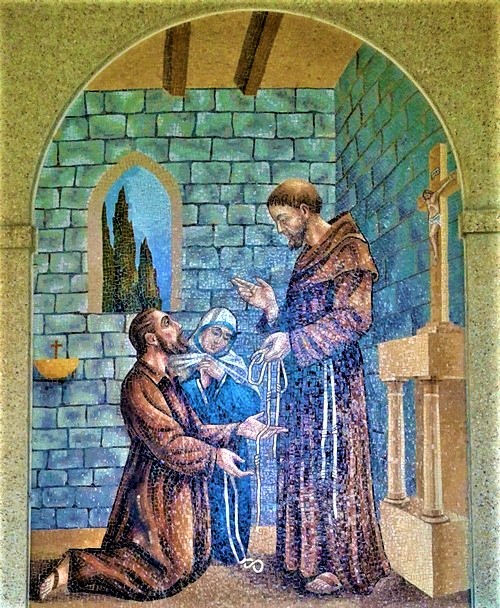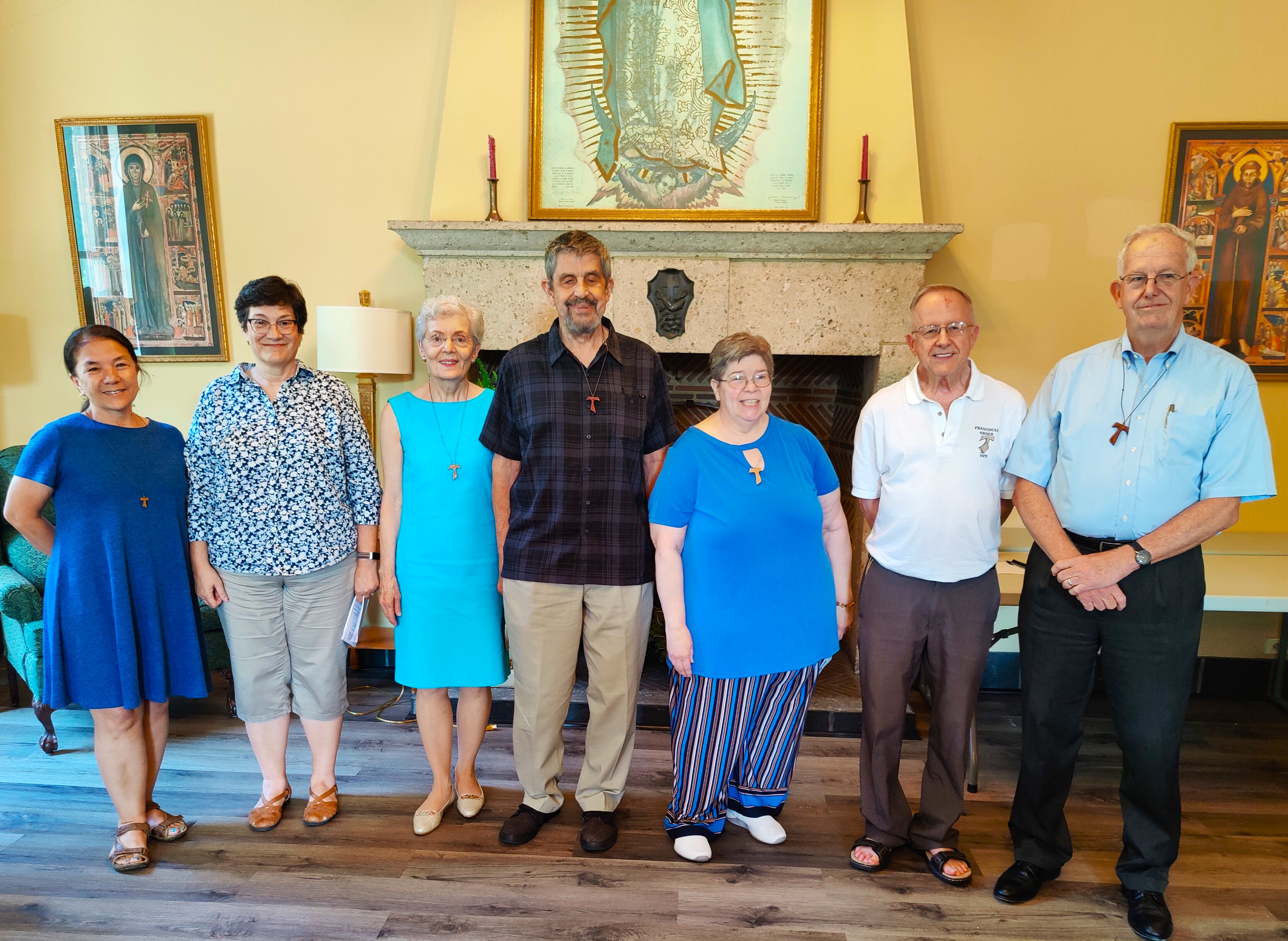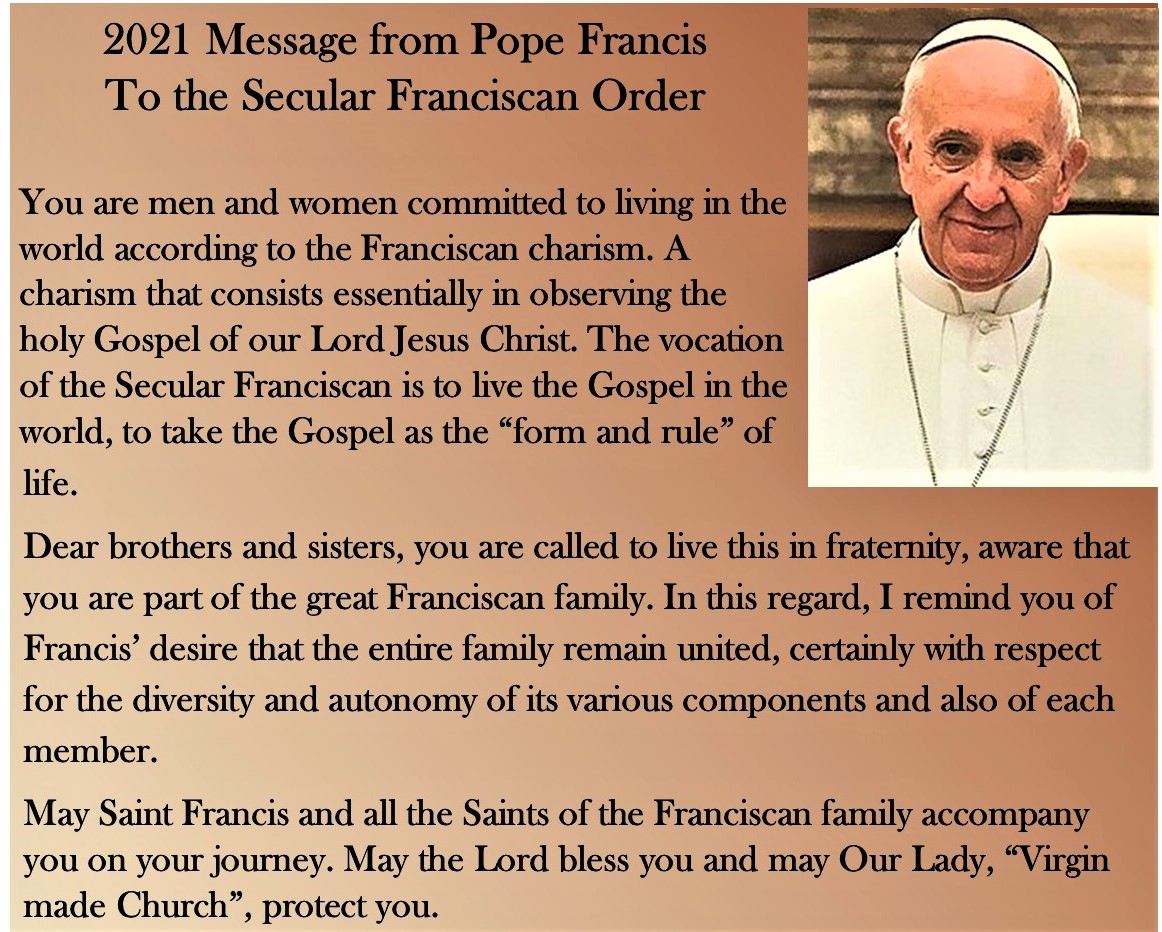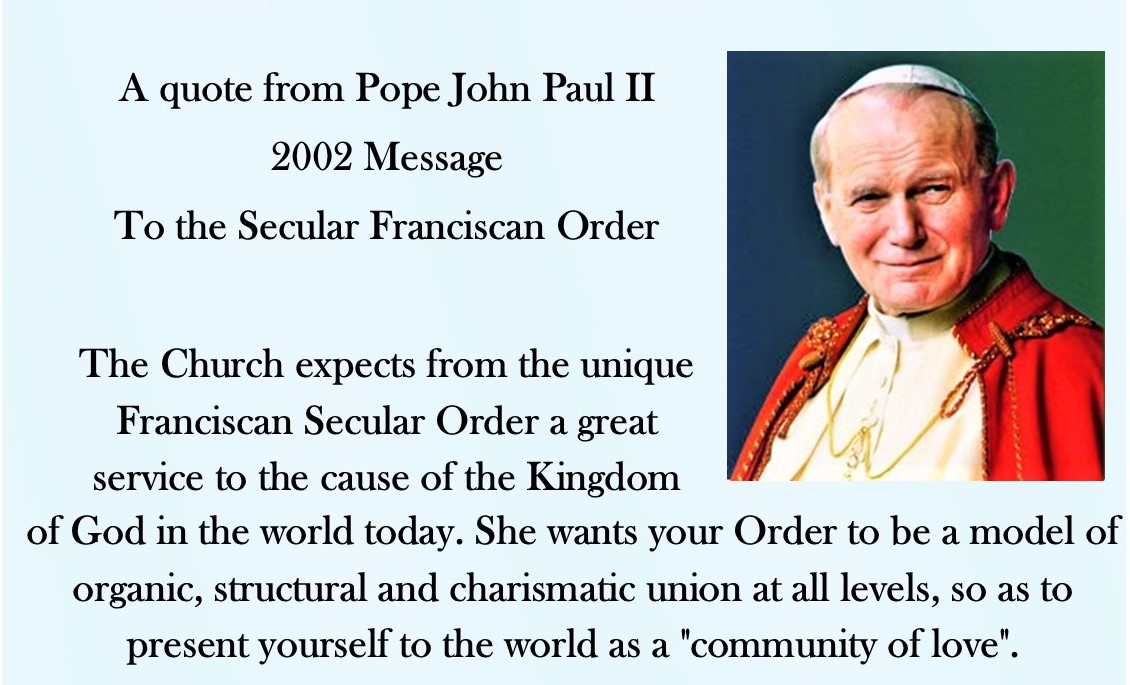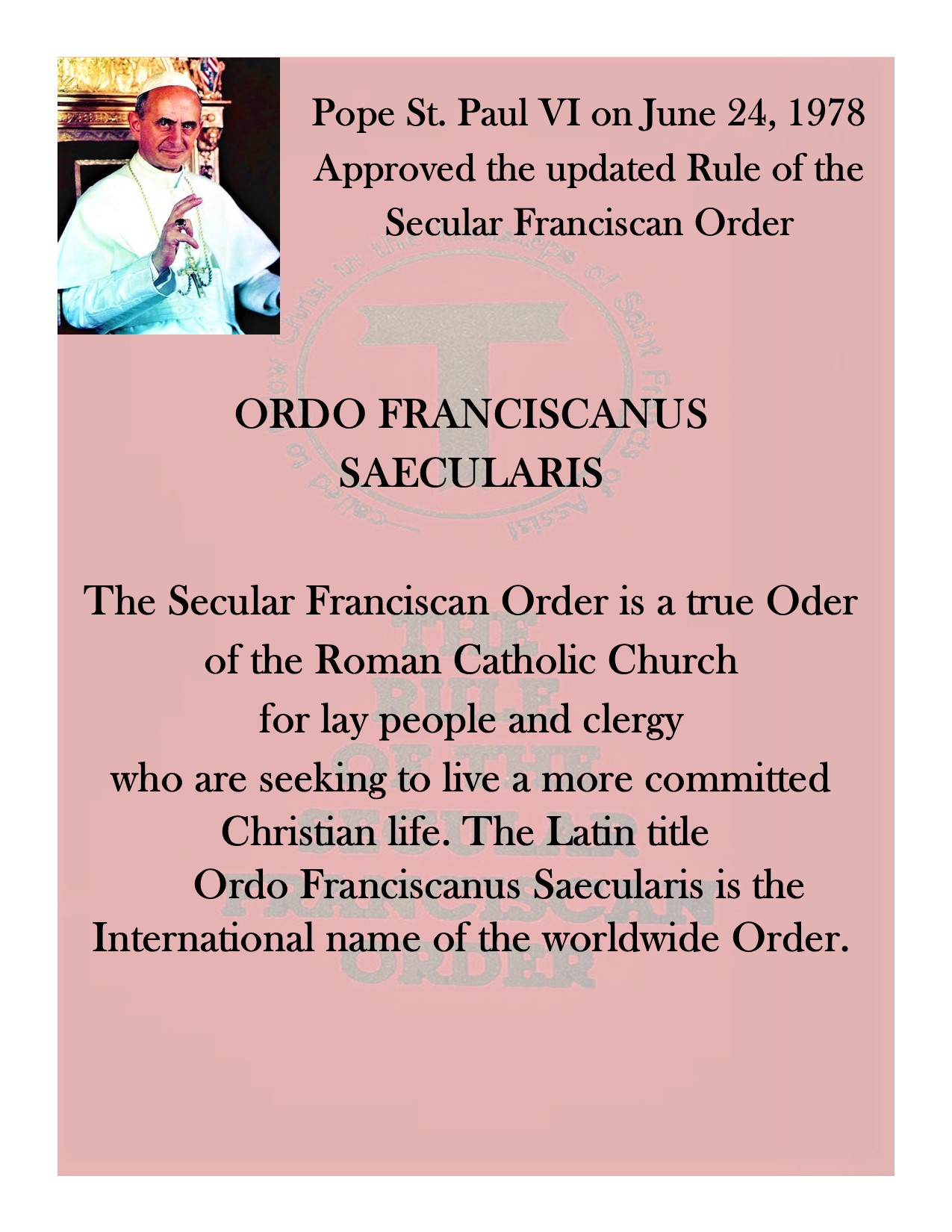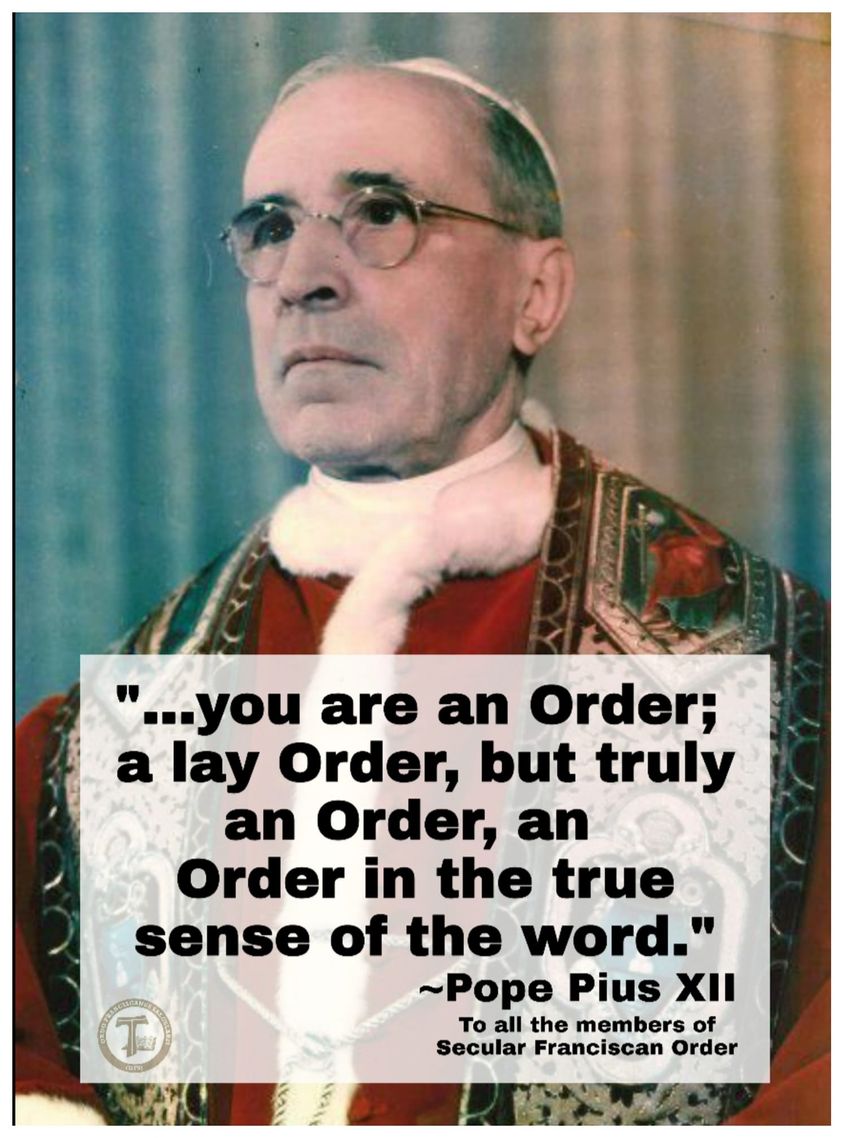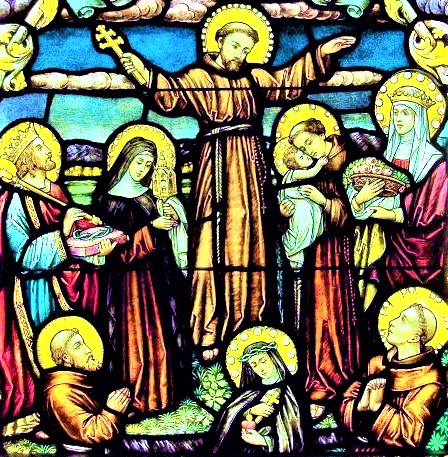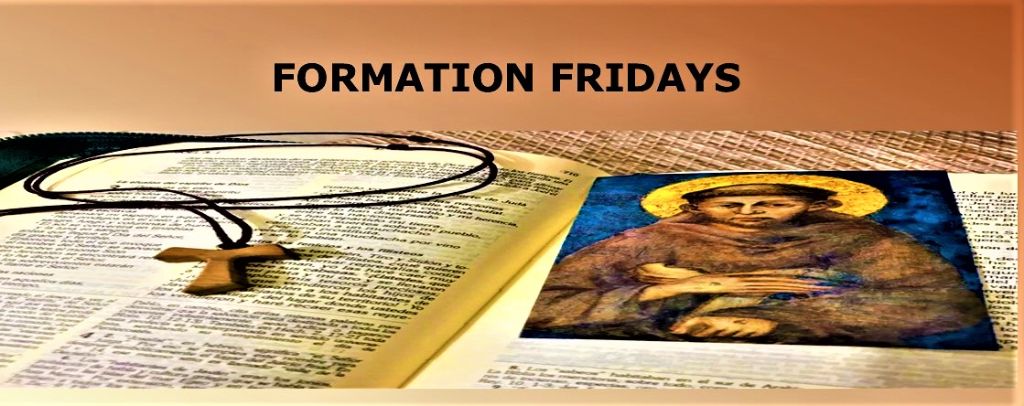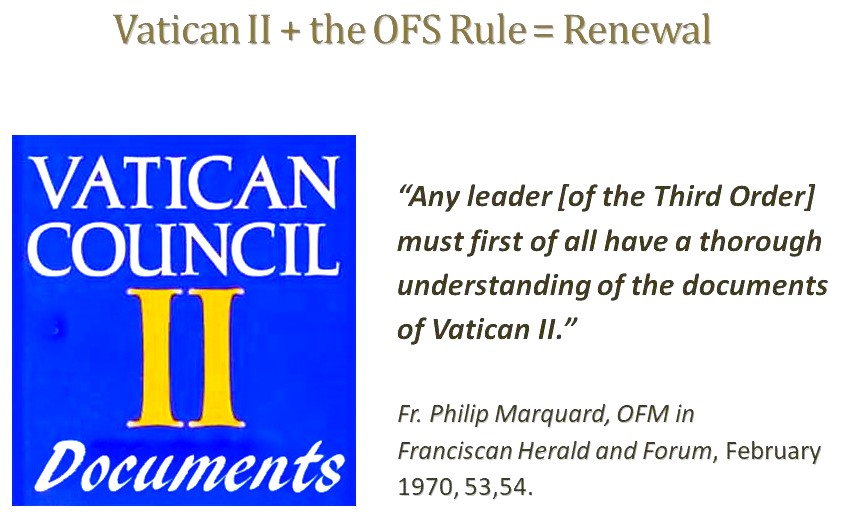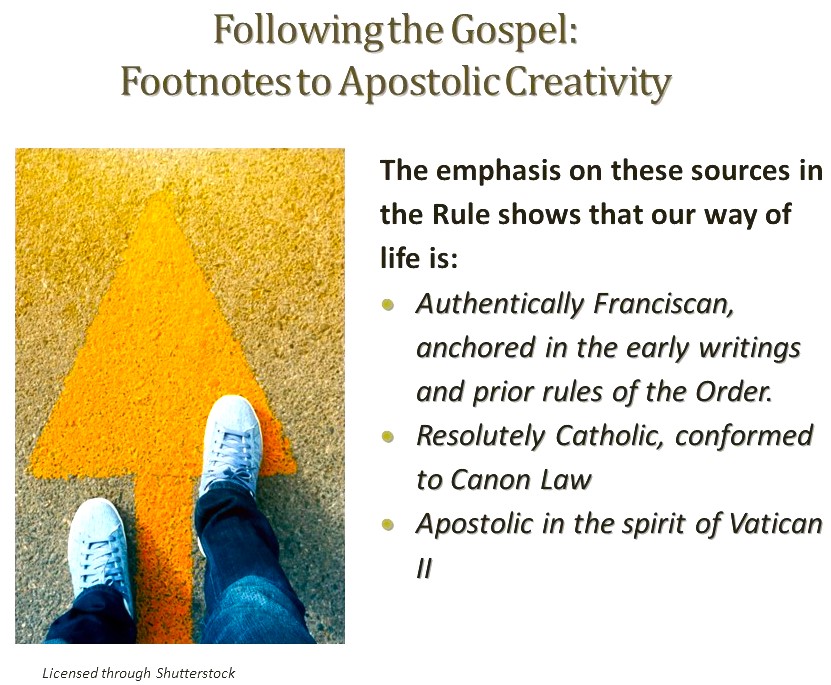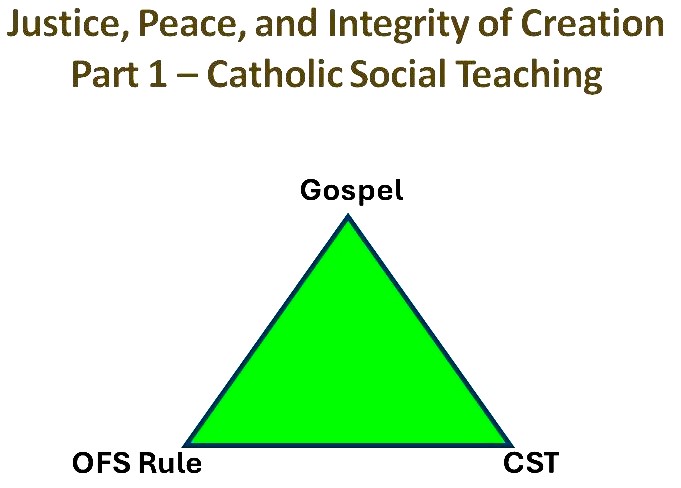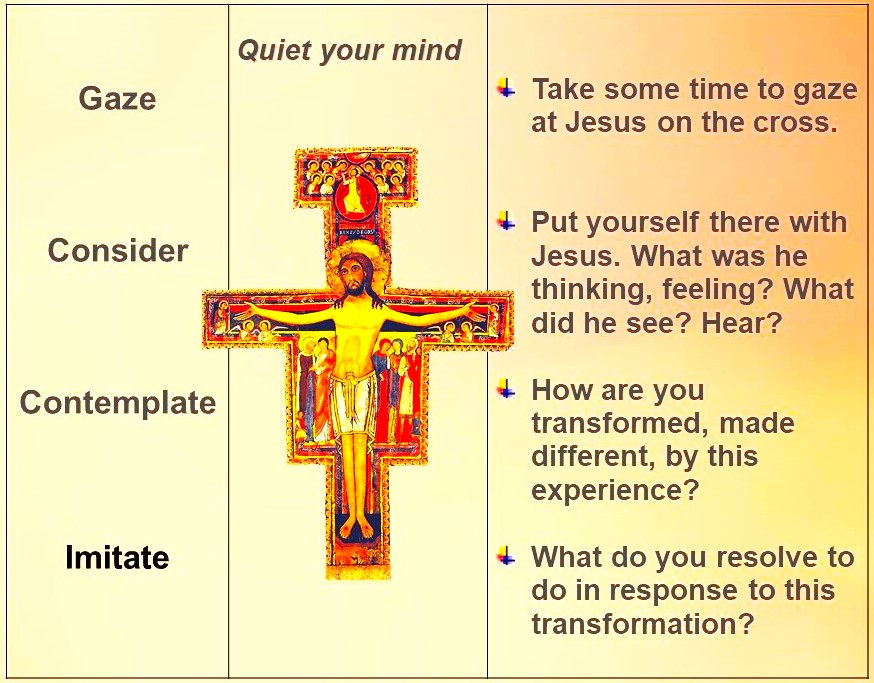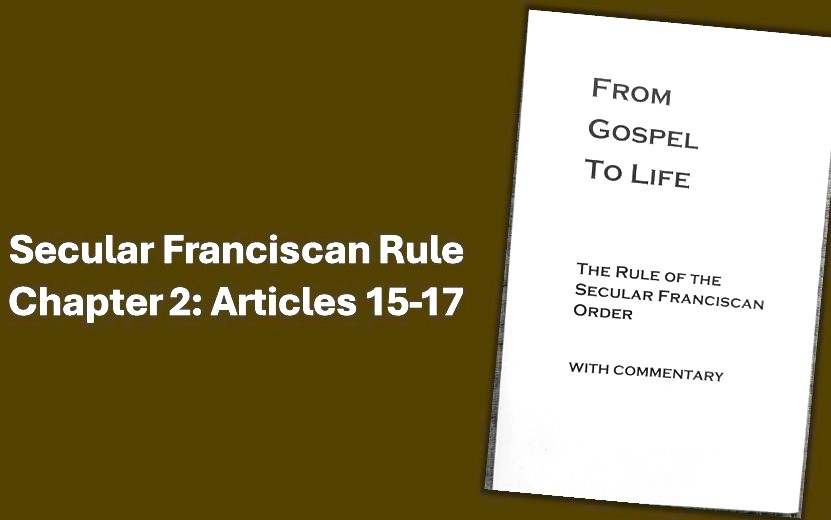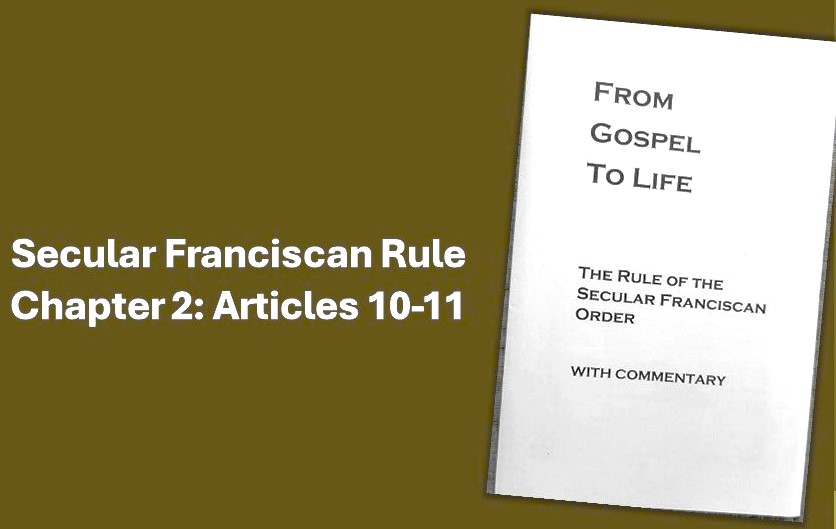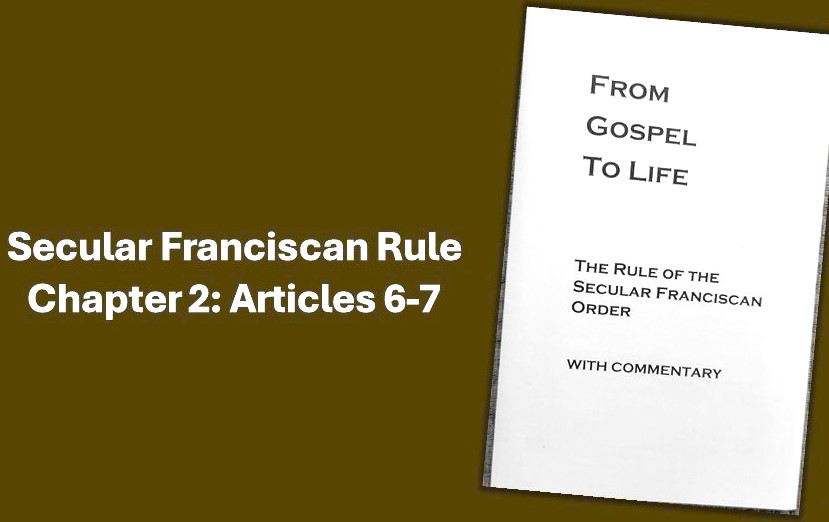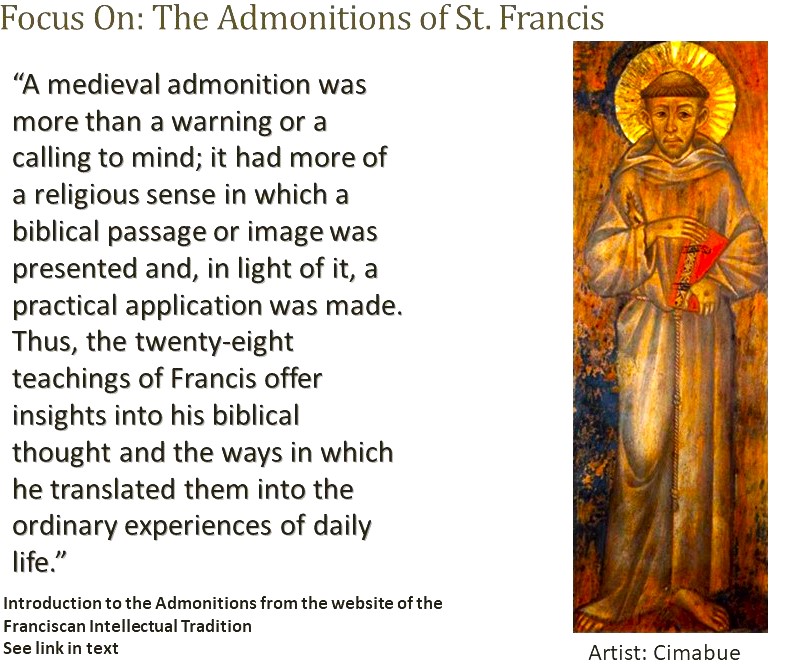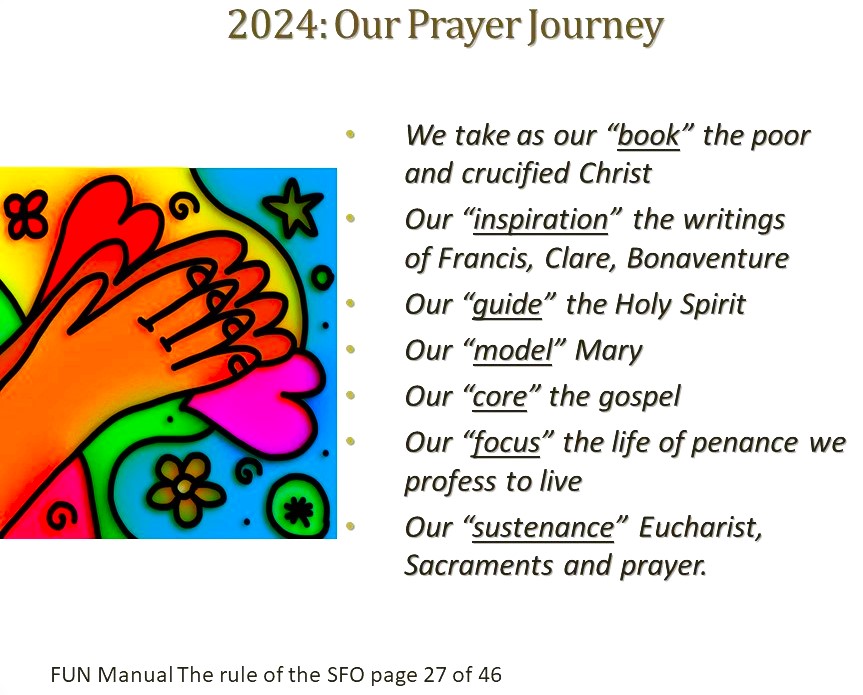To view past Formation Fridays
(Click on the Icon below)
*************************
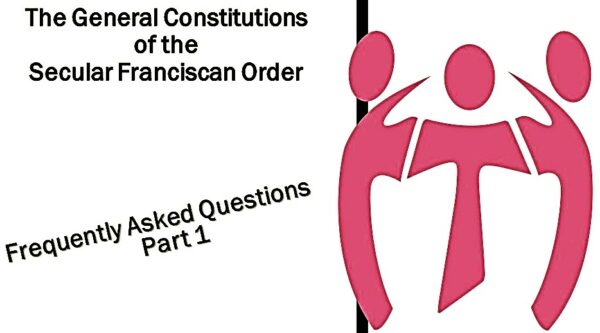
Formation Friday July 26, 2024
Constitutions #1
Frequently Asked Questions answered by our Constitutions: For the next several weeks we will take a look at some questions given in the 2010 edition of the Handbook for Servant Leadership. The same questions often arise in our councils and in our fraternities. Becoming familiar with the Constitutions is very helpful in addressing issues that arise in fraternities at all levels. For the complete, latest translation of the entire document, visit: The General Constitutions of the Secular Franciscan Order (2000) or Consilium Internationale OFS (CIOFS) | Secular Franciscan Order
+ What official relationship does the OFS have within the Church? (See General Constitutions (GC) Article 1.5)
“The OFS is a public association in the Church. It is divided into fraternities at various levels: local, regional, national, and international. Each one has its own juridical personality within the Church.” [This is important because it tells us that we have official standing in the Church.]
+ Who may belong to the OFS? (See GC Article 2.1 and 2.2)
“The OFS is open to the faithful of every state of life. The following may belong to it:
– the laity (men and women);
– the secular clergy (deacons, priests, bishops).”
“…those who are bound by a perpetual commitment to another religious family or institute of consecrated life cannot belong to the OFS”
+ How is the OFS life different from religious life?” (See GC Articles 3.1 and 3.2)
1. The secular state characterizes the spirituality and the apostolic life of those belonging to the OFS.2. Their secularity, with respect to vocation and to apostolic life, expresses itself according to the respective state, that is:
– for the laity, contributing to building up the Kingdom of God by their presence in their life-situations and in their temporal activities.
– for the secular clergy, by offering to the People of God the service, which is properly theirs, in communion with the bishop and the clergy.
Both are inspired by the gospel options of Saint Francis of Assisi, committing themselves to continue his mission with the other branches of the Franciscan Family.
+ How is the OFS governed? What are its governing documents? (See GC Article 4)
1. The OFS is governed by the universal law of the Church, and by its own: Rule, Constitutions, Ritual, and particular Statutes iii
2. The Rule establishes the nature, purpose, and spirit of the OFS.
3. Rule 3. The Constitutions have as their purpose:
– to apply the Rule.
– to indicate concretely the conditions for belonging to the OFS, its government, the organization of life in fraternity, and its seat8.iv
For discussion in fraternity or to comment on in your journal
· When was the last time you read any part of our General Constitutions?
· How will the articles above help you to explain our Order to other people? (Perhaps to someone new who comes to the fraternity.)
· Challenge: Read the articles of the Constitutions above in their full form including the footnotes and the endnotes on our website or on the CIOFS website. Take special note of items you did not know before or had forgotten and share them in a discussion at a fraternity gathering.
Diane F. Menditto, OFS
Vice Minister, National Fraternity, Secular Franciscan Order USA
Listen – Discern – Go Forth National Theme 2022-2025
**********************
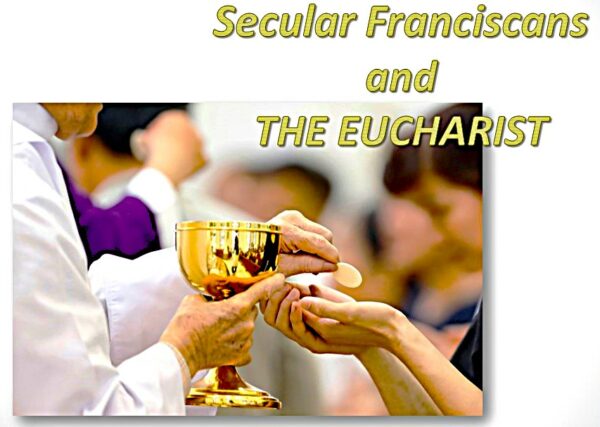
Formation Friday July 19, 2024
Secular Franciscans and the Eucharist
Please share with your local fraternity
Since July is the month of the Precious Blood, and we are also celebrating the three-year Eucharistic Revival, we repeat some of our previous posts on the Eucharist this month.
St. Francis was devoted to the Eucharist. In the first Admonition, he says. “This is my Body and the Blood of my new covenant [which will be shed for many];{snippet Mk 14:22} 11 and Whoever eats my flesh and drinks my blood has eternal life. {snippet Mk 14:24} 12 It is the Spirit of the Lord,{snippet Jn 6:55} therefore, That lives in Its faithful, That receives the Body and Blood of the Lord. 13 All others who do not share in this same Spirit and presume to receive Him eat and drink judgment on themselves. {snippet 1 Cor 11:29}”(The Admonitions: FA:ED, vol. 1, p. 129)
As we follow in the footsteps of our Seraphic Father, we, too, are devoted to the most precious Body and Blood of our Lord Jesus in the Eucharist. Let’s take a look at our Rule and Constitutions.
Rule Article 8: … “Let them participate in the sacramental life of the Church, above all the Eucharist….”
General Constitutions Article 14.2: (Refers to Art. 8 of the Rule) “The Eucharist is the center of the life of the Church. Christ unites us to himself and to one another as a single body in it. Therefore, the Eucharist should be the center of the life of the fraternity. The brothers and sisters should participate in the Eucharist as frequently as possible, being mindful of the respect and love shown by Francis, who, in the Eucharist, lived all the mysteries of the life of Christ.”
“The Holy Spirit builds up, animates, and sanctifies the Church. He prepares us to go out and bring others to Christ. He opens our minds to understand Christ’s death and Resurrection. He makes present for us the mystery of Christ, especially in the Eucharist, and brings us to communion with God that we may bear much fruit. (Cf. CCC – no. 737) United States Catholic Catechism for Adults – USCCB – Page 109
GC Article 53.2 & 4 (Refers to Articles 6 & 8 of the Rule) 2. ”The fraternity should come together periodically, also as a Church community to celebrate the Eucharist in a climate which strengthens the fraternal bond and characterizes the identity of the Franciscan family. Where, for whatever reason, this particular celebration may not be possible, they should participate in the celebration of the larger Church community.”
N.B. “The Eucharist, celebrated with parish members, draws us to the Church. It keeps us in touch with the local parish and diocesan community. The fraternity may periodically celebrate Eucharist at their fraternity gatherings.
This celebration is recommended for special occasions – e.g. Professions, jubilees of profession, a memorial Eucharist for the deceased of the SFO or other important occasions.” Cf. Benedict XVI’s quote from Sacramentum Caritatis on page 184-185 (Franciscan Journey p. 177) “Within the Church the Eucharist is the center of our lives. Attending a parish Eucharist is highly encouraged. We need to be consistently present at the gathering of the People of God. It reminds us of our union with the Church.” (Franciscan Journey p. 178)
A good video by Bishop Barron on the Eucharist: Real Presence and Visit the Eucharistic Revival website
Through our example, we help others to realize that Jesus is truly present in the Eucharist under the appearance of bread and wine. Please think about your relationship with Jesus in the Eucharist as you answer the questions below.
+Why is the Eucharist important to you as a Catholic? As a Franciscan?
+How do you prepare to receive the Body and Blood of Christ?
+How is the Eucharist tied to our Franciscan spirituality?
+Think about what our Rule and Constitutions say about the Eucharist. How are you opened up by these words to allow the Holy Spirit to transform you?
+In what ways can you show special reverence for the Eucharist?
*************************
Formation Friday June 21, 2024
Please share with your local fraternity
History of our Order: Use of the “habit” by Secular Franciscans
It is important for us to be aware of the history of our Order and why we do and do not do certain things. Here you can read the official document telling us that it was decided in 2011 that we are not to wear a habit. Many of us know this, some wonder about it, and new members hear about it and might not understand what we are talking about. So, here is a piece of our history.
For reference: Article 5.2 of the General Constitutions states, “The practical interpretation of the Constitutions, with the purpose of harmonizing its application in different areas and at the various levels of the Order, belongs to the General Chapter of the OFS.”
In the United States (and many other countries) the TAU cross is our distinctive sign of membership in the Order.
ORDO FRANCISCANUS SÆCULARIS
XIII. GENERAL CHAPTER
São Paulo, October 22-29, 2011

DECISION ON THE WEARING OF THE “HABIT” IN THE OFS
The General Chapter makes the following
DECISION
The practice of wearing a “habit” is not in conformity with the Rule and General Constitutions of the OFS, as already established.
As a practical interpretation (cf. Art. 5.2 GGCC) of Article 43 of the General Constitutions, the Chapter emphasizes and insists that the distinctive sign of membership in the Order is the “Tau or other Franciscan symbol”. (GGCC 43). A “Franciscan symbol” is a small and simple insignia that is worn on the person (for example, a San Damiano cross).
However, an OFS National Fraternity may determine in its National Statutes that the wearing a “uniform” is an acceptable sign of recognition for Secular Franciscans of their own country, providing that the following mandatory criteria is followed:
a) the uniform does not replace the TAU or the Franciscan symbol selected by the National Fraternity
b) the nature of the uniform is to be specified in the National Statutes, including a detailed description (preferably graphical) and be of a style that respects the secularity of the members of the Order;
c) the style of the uniform should not look like the habit worn by member of a religious Order, so as to avoid bringing confusion between religious and seculars;
d) the occasions during which this uniform may be worn must be precisely indicated and specifically excludes its use during the rites of admission and/or profession.
The Chapter states that the decision replaces all previous documents in this regard, and becomes in effect now and for the future.
São Paolo, October 29, 2011
![]()

Encarnación del Pozo, OFS
General Minister
Diane F. Menditto, OFS
Vice Minister, National Fraternity, Secular Franciscan Order USA
Listen – Discern – Go Forth National Theme 2022-2025
*************************
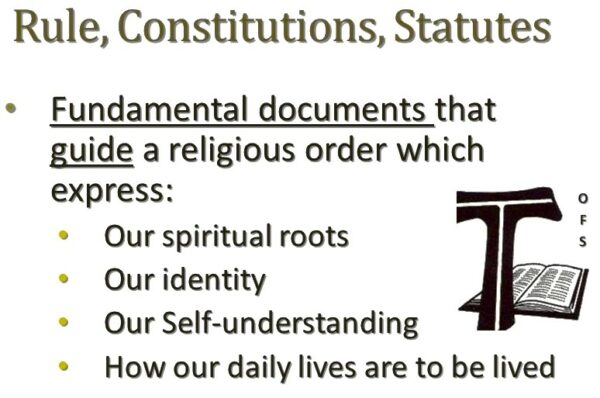
Formation Friday June 14, 2024
Please share with your local fraternity
Documents of the Secular Franciscan Order
We have recently completed a series of Formation Fridays delineating each section of our Rule and providing commentary. We hope that each local fraternity has been encouraged to use those posts as a basis for ongoing formation on the Rule. It is also very important for each member (especially those serving on Councils) to become familiar with our General Constitutions and National Statutes since they help us to live out the Rule and to navigate most (or many) of the situations (both good and challenging) we encounter in fraternity life.
+ We have one Rule with a Prologue and 26 articles (Calling the articles “rules” implies a restrictive list rather than a way of life!)
Religious orders and institutes follow the charism of their founders. Generally, the founder writes or inspires the Rule of a particular community. The intention of a Rule is that the members of the order will have the inspiration of the founder to live by when he or she is no longer among them. The Rules of religious communities, although requiring approval by the Holy See, are general, most of the time without the specifics that will be necessary to govern a religious community and to live out the Rule authentically.
“The word ‘rule’ (Latin: regula, Greek: kanon) literally means a standard by which something can be tested. In the case of religious or secular institutes it establishes the spiritual foundation and identity of the community. It is the norm which all the other documentation of the institutes – constitutions, statutes, etc. – are measured. Approbation of rules for religious and secular institutes in the Church is reserved to the Holy See.” (See Michael Higgins, TOR, “Importance of Familiarization with the Documents of the Secular Franciscan Order.”)
A Rule is not a list or set of “rules” but the outline of a plan or way of life to help us live out the vision of the founder. In our case the vision for Secular Franciscans is put forth in a Prologue and 26 articles.
+We have General Constitutions which help us to carry out the Rule and govern the Order.
The Constitutions (also approved by the Holy See) are much more specific about the way the Rule should be interpreted and carried out. Here is an explanation by Fr. Lester Bach, OFM Cap., in the Franciscan Journey p. 106:
“The SFO (OFS) Constitutions contain comments on the Rule and insights for understanding the Rule. The Constitutions point out structures to help the Rule come alive in community life. The Constitutions spell out things like canonical procedures and structural developments. They deal with issues of lukewarm members and the role of the servant leaders of fraternity life (councils). The Constitutions present ways and means to deal with issues that may arise in fraternity life.”
Ministers and Councils should take note that before difficult decisions are made about fraternity life or about individual members, the Constitutions should be consulted. Much confusion can be avoided if this suggestion is always followed.
+National Statutes are developed by the National Fraternity to aid in governing all levels of the National Fraternity.
Article 29.3 of the General Constitutions calls for each national fraternity to develop its own statutes. “National Statutes should indicate the criteria for the organization of the OFS in the nation. The application of these criteria is left to the prudent judgement of those responsible for the Fraternities concerned and of the National Council.” National Statutes are not approved by the Holy See but must be approved by the council of the higher level. (CIOFS) The statutes of a particular country take into account the culture and customs of that country and add further particulars to what is laid out in the Constitutions. Statutes may be more restrictive than the Constitutions, but not less restrictive.
Every member should have access to the Rule, Constitutions, and Statutes. You will find our documents in their latest translations on our national website and on the CIOFS website. (Links below)
OFS Governing Documents and Official CIOFS Documents of the OFS
Questions for discussion or to answer in your journal:
+When was the last time you read our Rule and Constitutions? Please take some time to read them: Choose two or three areas to focus on in the next week. Continue this practice until you have read both documents completely.
+List some of the items that stood out to you as you were completing the above “labor of love.”
+How does your fraternity use the Rule and Constitutions for ongoing formation? Make a list of ideas for their use and submit it to your local council or fraternity formation team.
+Resolve to pray one article of the Rule each day!
Diane F. Menditto, OFS
Vice Minister, National Fraternity, Secular Franciscan Order USA
Listen – Discern – Go Forth National Theme 2022-2025
*************************
May 31, 2024 Friday Formation
At the time of our Baptism, we are called to be Priest, Prophet, and King along with our Lord Jesus Christ. This applies to every Catholic. We find the following in the Catechism of the Catholic Church:
Baptism makes us members of the Body of Christ. … “to be a holy priesthood” (1 Peter 2:5). By Baptism they share in the priesthood of Christ, in his prophetic and royal mission. They are “a chosen race, a royal priesthood, a holy nation, God’s own people …” (1 Peter 2:9). Baptism gives a share in the common priesthood of all believers (CCC, 1267, 1268).
Christ, high priest and unique mediator, has made of the Church “a kingdom, priests for his God and Father” (Revelation 1:6, see 5:9–10; 1 Peter 2:5,9). … The faithful exercise their baptismal priesthood through their participation, each according to his own vocation, in Christ’s mission as priest, prophet, and king (CCC, 1546).
“Profession in the Secular Franciscan Order reinforces our Baptismal promises. Our call to the Franciscan way of life points out the path for us to follow. This baptismal source of unity reaches beyond the boundaries of states, languages, cultures, and social classes. We are one in Christ. We are called to spread the Gospel and influence the world and the Church with the Gospel of Jesus flavored by our Franciscan spirit.” (Franciscan Journey p.48)
How is our call to be Priest, Prophet, and King made clear by our Rule?
+Priest: the link between God and human beings; harmony; peacemaking; prayer and sacramental life; relationship with Christ; bring this to the larger community through example.
We find this in numerous places in our Rule and Constitutions–Rule : Article 5; Article 8; Article 10; Article 11; Article 12; Article 19 ; Constitutions : Article 2.1 ; Article 3.2, 3.3 ; Article 8 ; Article 10 ; Article 11 ; Article 12.3 ; Article 13 ; Article 14
+Prophet: speaks the truth about God in words, actions, and personal example; and speaks of the signs of the times—through a Catholic (and in our case Franciscan lens); We are responsible for our own ongoing formation as Catholics and Franciscans; Scripture, the writings of Francis, Clare, and Bonaventure; the writings of the great Catholic theologians; we also have the opportunity to learn within our fraternities.
Rule and Constitutions–Rule: Article 4; Article 6; Article 13; Constitutions: Article 8.2; Article 9.2; Article 12 ; Article 15
+King: sees the talents of the community and directs those talents toward God; is willing to be a servant leader; understands that we are all called and encourages those in his or her care to fulfill their vocation.
Rule and Constitutions–Rule : Article 15; Article 16; Article 17; Article 18; Article 21 ; Article 24 ; Constitutions : Article 1 5; Articles 17-27
As you can see, our Rule and Constitutions reaffirm and strengthen our call to fulfill the role of Priest, Prophet, and King in our daily lives as Secular Franciscans. Please read the articles mentioned above (you may be able to find even more that apply.) After reading the articles (available here in English: Ordo Franciscanus Saecularis Consilium Internationale OFS (CIOFS) | Secular Franciscan Order, answer the following in your journal or with a prayer partner:
+How do you live out the call to be “Priest, Prophet, and King?”
+In what ways does our Rule help us to move in the right direction?
+Which parts of this call are most comfortable for you? Which do you find most challenging?
Diane F. Menditto, OFS
Vice Minister, National Fraternity, Secular Franciscan Order USA
Listen – Discern – Go Forth National Theme 2022-2025
*************************
Formation Friday, May 24, 2024
Please share with your local fraternity.
Rule of the Secular Franciscan Order
Chapter 3 Articles 25-26
Article 25: Regarding expenses necessary for the life of the fraternity and the needs of worship, of the apostolate, and of charity, all the brothers and sisters should offer a contribution according to their means. Local fraternities should contribute toward the expenses of the higher fraternity councils.44
Article 26: As a concrete sign of communion and co-responsibility, the councils on various levels, in keeping with the constitutions, shall ask for suitable and well-prepared religious for spiritual assistance. They should make this request to the superiors of the four religious Franciscan families, to whom the Secular Fraternity has been united for centuries.
To promote fidelity to the charism as well as observance of the Rule and to receive greater support in the life of the fraternity, the minister or president, with the consent of the council, should take care to ask for a regular pastoral visit by the competent religious superiors as well as for a fraternal visit from those of the higher fraternities, according to the norm of the Constitutions.45
“And whoever observes these things let him be blessed in Heaven with the blessing of the Most High Father, and on earth with the blessing of His Beloved Son with the Most Holy Spirit the Paraclete.”
(Blessing of St. Francis found in The Testament of Francis)
Commentary
Article 25: Paragraph 25 points out that the voluntary contributions of the members finance the fraternity’s spiritual and temporal needs and activities. The fraternity, according to its means and agreed-upon arrangements, also contributes to the support of regional, national, and international fraternities. This paragraph is a contemporary application of the traditional Secular Franciscan values outlined in the very first rule, that the members are responsible for taking care of their own in whatever way is necessary.
Article 26: Finally, the rule speaks of the spiritual assistance of the clergy; it also refers to the need of the friars to share fellowship and their Franciscan vocation with the Secular Franciscans (26). Three important implications are drawn from this paragraph: First of all, since the Secular Franciscan Order is basically a lay order, the laity themselves are primarily responsible for their own spiritual growth and have the duty to get the proper assistance to achieve this end. Secondly, spiritual assistants should have a good background in Franciscanism and Vatican Council II (especially the role of the laity) and a willingness to share their own vocation with the Secular Franciscan community. Thirdly, the official visit to the fraternity is given a dual role; spiritual growth is ensured through pastoral visitation by a Franciscan friar. Organizational development is provided by the fraternal visitation of a higher lay leader.
For discussion with a partner, in a group, or to comment on in your journal:
+Re-read articles 25-26 and the commentary:
— Sharing in expenses
· What do you understand the monthly contribution to the fraternity to be?
· How would you explain this to a new member?
—Spiritual Assistance
· Does your fraternity have a spiritual assistant? If yes, is it a friar, sister, or a Secular Franciscan? If no, who takes care of the spiritual needs of your fraternity?
· In what ways does your spiritual assistant serve your fraternity? If you know your regional spiritual assistant, tell how he serves your region.
Diane F. Menditto, OFS
Vice Minister, National Fraternity, Secular Franciscan Order USA
Listen – Discern – Go Forth National Theme 2022-2025
*************************
Formation Friday, May 17, 2024
Please share
The OFS-USA National Fraternity has recently published “From Gospel to Life,” the OFS Rule with Commentary. This occasional series highlights the Prologue (See November 17th and 24th) and the articles of the Rule, the commentary, and questions based on this publication for fraternity discussion. You may order “Gospel to Life” by clicking on the blue font.
Rule of the Secular Franciscan Order
Chapter 3 Article 23-24
Article 23: Requests for admission to the Secular Franciscan Order must be presented to the local fraternity, whose council decides upon the acceptance of new brothers and sisters.
Admission into the Order is gradually attained through a time of initiation, a period of formation of at least one year, and profession of the Rule. The entire community is engaged in this process of growth by its own manner of living. The age for profession and the distinctive Franciscan sign are regulated by the statutes. Profession by its nature is a permanent commitment.
Members who find themselves in particular difficulties should discuss their problems with the council in fraternal dialogue. Withdrawal or permanent dismissal from the Order, if necessary, is an act of the fraternity council according to the norm of the constitutions.
Article 24: To foster communion among members, the council should organize regular and frequent meetings of the community as well as meeting with other Franciscan groups, especially with youth groups. It should adopt appropriate means for growth in Franciscan and ecclesial life and encourage everyone to a life of fraternity. This communion continues with deceased brothers and sisters through prayer for them.
Commentary
Article 23: Paragraph 23 points out the importance of the initial orientation, with elements of both instruction and experience directed toward a lifetime commitment in the Order. It also stresses the role of the council in the development of community, especially for new members and for errant members. A number of important implications develop from this paragraph: It is the responsibility of primarily the council (not just the president or the spiritual assistant) to lead new members to commitment and to exercise charity in particular difficulties. The life of the whole fraternity contributes to the growth of the new members and consolidates it. Furthermore, profession is highlighted as a mature and enduring decision to participate as fully as possible in the Church’s life and mission according to the manner of Francis.
Article 24: Paragraph 24 discusses the means to express a strong and lasting fraternity spirit. The regular and frequent meeting (ordinarily once a month) is the way to build fraternity with prayer, education, apostolic activity, dialogue, and leisure. Continuing education in Franciscanism and Church life is also stressed as a means of spiritual growth and community building.
For discussion with a partner, in a group, or to comment on in your journal:
+Re-read articles 23-24 and the commentary:
— Initial formation and entry into the order
· For professed members: Describe your experience during your time of discernment and initial formation.
· For those who have been admitted to initial formation: What is your experience with your fraternity’s formation program? How are you being prepared for fraternity life?
· What role has your fraternity played in helping you to discern or to maintain your vocation?
—The responsibility of the local fraternity
· Does your fraternity meet regularly in person?
· Describe a typical gathering. How does it help to strengthen you as a Secular Franciscan?
Diane F. Menditto, OFS
Vice Minister, National Fraternity, Secular Franciscan Order USA
Listen – Discern – Go Forth National Theme 2022-2025
*************************
Formation Friday, April 26, 2024
Justice, Peace, and the Integrity of Creation #3 (Our series on the Rule will continue next month.)
Thank you to Joe Makely, OFS, National JPIC Animator for contributing this piece.
What does it mean that our Rule is influenced by Vatican II? It means we experienced a renewal.
At the close of Vatican II, the friars led the tertiaries to follow long sought after reforms. Their guidelines included the major documents of Vatican II about the laity. It was a very exciting time for the Third Order, when we finally gained our autonomy and an affirmation of the lay charism. One of the luminaries was Fr. Philip Marquard, OFM, who wrote in 1970: “Any leader [of the Third Order] must first of all have a thorough understanding of the documents of Vatican II. They must be read and reread so that one understands their true direction. The Church is not looking for mere adaptation, but renewal. There was nothing Pope John stressed more strongly than this point.” (See note 1)
The process of renewal included a very serious study of the early penitents, as described by Mrs. Pamona Pefanis, a Third Order participant from Canada who attended the gatherings in Assisi: “The strongest impression I received from the entire historians’ congress was that the 13th Century Penitenti were deeply involved in the social and political problems of their period, and that we must emerge from our cocoon of pious devotions and embroil ourselves in the problems of our day, bringing to them the same evangelical fervor that motivated the 13th Century members of our order.” (See note 2)
So that’s a partial picture of how we got those lively apostolic phrases in our Rule, like “promoting justice [with] courageous initiatives” and how we eventually got the Apostolic Commissions, which became (in accord with the 1st Order) Justice, Peace and the Integrity of Creation. The “how” of JPIC, our emphasis on loving dialogue and obedience, is central to what we do and that goes back to Francis himself, who said of his friars: “… they should be gentle, peaceful, and unassuming, courteous and humble, speaking respectfully to everyone, as is expected of them.” (See note 3) It did not mean departure from the vision of the founder, but was a call to restudy, reembrace that vision and adapt it to the needs of the current generation.
For discussion or to answer in your journal:
Question 1. In what ways is my fraternity bringing evangelical fervor to the problems of society?
Question 2. Have I read the documents of Vatican II myself, more than once? After reading them again, write down any questions you have and see if your group (or an outside source) will answer them for you.
Question 3. Does my region/fraternity have a JPIC animator? Discuss with the group who might be gifted in this area.
Challenge: Consider initiating a fraternity formation or workshop based on Article 14.1 of the General Constitutions: “They should commit themselves to a faith-inspired reflection on the Church, its mission in today’s world and the role of the Franciscan laity within it. They should take up the challenges and accept the responsibilities that this reflection will lead them to discover.” (See note 4)
Notes
1-Franciscan Herald and Forum, February 1970, 53,54.
2-A History of the Secular Franciscan Order in the United States, Volume IIA, p 409
3-ST. Francis of Assisi, Rule of 1223, Chapter 3, Omnibus of Sources, P.60
4-OFS General Constitutions, Article 14.1
Diane F. Menditto, OFS
Vice Minister, National Fraternity, Secular Franciscan Order USA
Listen – Discern – Go Forth National Theme 2022-2025
*************************
Formation Friday April 19, 2024
Justice, Peace, and the Integrity of Creation #2 (We will return to the series on the Rule in May.)
Thank you to Joe Makely, OFS, National JPIC Animator for contributing this piece.
Following the Gospel: Footnotes to Apostolic Creativity
Our Pauline Rule has 45 references, most of which point to one of three sources:
- The early Franciscan documents (16)
- Canon Law (6)
- The papal writings of St. Paul VI and Vatican II (17)
The emphasis on these sources in the Rule shows that our way of life is:
- Authentically Franciscan, anchored in the early writings and prior rules of the Order.
- Resolutely Catholic, conformed to Canon Law
- Apostolic in the spirit of Vatican II
Secular Franciscans carry the spirit of the Vatican II renewal. We are Vatican II people. It’s not about liturgical controversies or communion in the hand. It’s about the vision for lay Catholics to go forth and work to improve conditions in the temporal world. The Order, like the Church, bears eternal truths of salvation, but must also be alive to current conditions, and bring “apostolic creativity” (See note 1) and “a sense of the provisional” (See note 2) to truly serve humanity in this generation. The JPIC Animators’ handbook says, “While each fraternity is not required to establish a common apostolate, many benefits accrue to those who can.” It advises a local approach: “Identify the greatest need in your area, where the least is being done, where you can make an impact.” (See note 3)
For discussion in fraternity or to comment on in your journal:
Question 1. When my fraternity discusses apostolates, have we asked ourselves lately what our community needs? (See challenge below.)
Question 2. In what places, outside of our usual meeting place, could a visitor see our fraternity, or some of its members, in action?
Question 3. Have we included Peace, Justice, and Care for Creation in our apostolate activity? (If yes, give examples. If no, see challenge below.)
Challenge: Suggest to the fraternity council that they initiate a formal needs assessment in developing ideas for apostolates. Include a reflection on injustices, peacemaking, human dignity, care for creation, etc.
Notes:
1-OFS Rule P.6, (ref. St Paul VI.)
2-Fr. Philip Marquard, OFM, Franciscan Herald and Forum, 1968
3-Handbook for Animators of Justice, Peace and Integrity of Creation (JPIC.) p.26
Diane F. Menditto, OFS
Vice Minister, National Fraternity, Secular Franciscan Order USA
Listen – Discern – Go Forth National Theme 2022-2025
*************************
Formation Friday – April 12, 2024
(We will return to the series on the Rule in May)
Thank you to Joe Makely, OFS, National JPIC Animator for contributing this piece.
The members of our order have a special call as lay people in the Church. We are to live the Gospel, each in our own way, but within the boundaries of our Rule and informed by Catholic Social Teaching, sometimes referred to as CST, in which the Church breaks open the Gospels for the world in each age and generation. We have duties and obligations that require us to have familiarity with at least some parts of the Church’s teaching on public life. (Also see Formation Friday of March 1, 2024)
GOSPEL>>>>CATHOLIC SOCIAL TEACHING>>>RULE
In the JPIC handbook (available on our website), a triangle is used to show the connection between the Gospels, The Rule and CST. The Rule and the teaching documents of the Church are Christ-centered. They tell us how to follow the Gospels.
For example, our Rule (See Article 15) is influenced by St. Paul VI’s Decree on The Apostolate of The Laity, APOSTOLICAM ACTUOSITATEM, specifically a passage in section 14 of that document:
“In loyalty to their country and in faithful fulfillment of their civic obligations, Catholics should feel themselves obliged to promote the true common good. Thus, they should make the weight of their opinion felt in order that the civil authority may act with justice and that legislation may conform to moral precepts and the common good.”
For discussion in fraternity, with a partner, or to comment on in your journal:
Question 1. If I shared my views on a public issue, could I explain how they are Catholic? (Give an example.)
Question 2. Would my Secular Franciscan brothers and sisters say that I work courageously for justice? (How might they describe my efforts?)
Question 3. Would a spouse or close friend say that I care whether my views on a public policy are consistent with Catholic teaching? (Give an example.)
Challenge: Prayerfully Reflect on the passage above, and Article 15 of our rule, which references it. Set a goal to educate yourself about an issue you have not had time to be involved with and consider taking a courageous stand on the side of justice. (If you are sharing in fraternity, report back to the group.)
Diane F. Menditto, OFS
Vice Minister, National Fraternity, Secular Franciscan Order USA
Listen – Discern – Go Forth National Theme 2022-2025
*************************
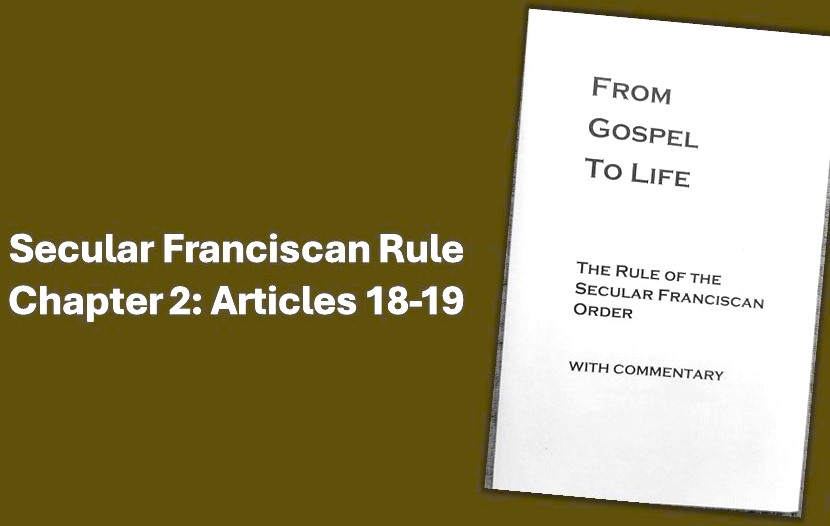
Formation Friday – April 5, 2024
The OFS-USA National Fraternity has recently published “From Gospel to Life,” the OFS Rule with Commentary. This occasional series highlights the Prologue (See November 17th and 24th) and the articles of the Rule, the commentary, and questions based on this publication for fraternity discussion. You may order “Gospel to Life” by clicking on the blue font.
Rule of the Secular Franciscan Order
Chapter 2 Articles 18-19
Article 18: Moreover, they should respect all creatures, animate and inanimate, which “bear the imprint of the Most High,”30 and they should strive to move from the temptation of exploiting creation to the Franciscan concept of universal kinship.
Article 19: Mindful that they are bearers of peace which must be built up unceasingly, they should seek out ways of unity and fraternal harmony through dialogue, trusting in the presence of the divine seed in everyone and in the transforming power of love and pardon.31
Messengers of perfect joy in every circumstance, they should strive to bring joy and hope to others.32
Since they are immersed in the resurrection of Christ, which gives true meaning to Sister Death, let them serenely tend toward the ultimate encounter with the Father.33
Commentary
Article 18: Ecology (the relationship of creatures with themselves, their environment, and their God) is a fourth expression of the Franciscan apostolate (18). Francis saw all creation—the sun and moon, the weather and water, fire and earth, forgiving people and death itself—as symbols of the union between God and his people. Hence, all creation has a sacred quality and enjoys a oneness with people in the history of salvation. Following the example of Francis, the Secular Franciscans express a profound respect for all creation and use it for its intended God-given purpose. Furthermore, they ennoble nature and technology and build a community conscience toward using natural resources. This ministry toward creation will stem the selfish tide of abuse and waste and exploitation in this world.
Article 19: A particularly Franciscan ministry is peace-making (19). Peace grows out of the search for personal integrity and harmony with others and the discovery of God’s presence everywhere. It is built up by affirming oneself, seeing others as revealers of God’s love, taking a positive approach to solutions, and communicating constantly with the Lord. It is putting aside all thought of violence and embracing a largeness of heart. The result of peace is joy and hope. A special application of this ministry of peace-making is preparation for death, at which time a person arrives at that ultimate encounter with God and an eternal peace in his presence that fulfill the earthly quest for peace.
For discussion with a partner, in a group, or to comment on in your journal:
+Re-read article 18 and the commentary:
–Caring for creation
- How is your relationship with the environment?
- Please describe what “universal kinship” with all of creation means to you.
+Re-read article 19 and the commentary:
—Peacemakers and messengers of “perfect joy”
- Please give some examples of how you have served as a peacemaker.
- Who is the best Franciscan peacemaker you know? What example do they set for others?
- What are some ways that we, individually and as a fraternity, can bring “joy and hope” to others?
Diane F. Menditto, OFS
Vice Minister, National Fraternity, Secular Franciscan Order USA
Listen – Discern – Go Forth National Theme 2022-2025
*************************
Formation Friday – March 29, 2024
Since today is Good Friday, it is an extra special time to follow Saint Clare’s Gazing on the cross of our Lord Jesus Christ as found in her second letter to Saint Agnes of Prague.
19“Look upon Him Who became contemptible for you,
and follow Him, making yourself contemptible in this world
for Him.
20Most noble Queen,
gaze,
consider,
contemplate
desiring to imitate Your Spouse,
[Who] though more beautiful than the children of men became, for your salvation, the lowest of men, was despised, struck, scourged untold times throughout His entire body, and then died amid the suffering of the Cross.
21If you suffer with Him, you will reign with Him.
weeping with Him, you will rejoice with Him;
dying on the cross of tribulation with Him,
you will possess heavenly mansions with Him
among the splendor of the saints
22and in the Book of Life your name will be called glorious among
the peoples.”
The Lady Clare of Assisi: Early Documents, CA:ED,49: 19-22
- GAZE: Take some time to gaze at Jesus on the cross.
- CONSIDER: Put yourself there with Jesus. What was he thinking, feeling? What did he see? Hear?
- CONTEMPLATE: Inspired by the Holy Spirit, how are you transformed, made different, by this experience?
- IMITATE: What do you resolve to do in response to this transformation?
For Discussion or to comment on in your journal.
- As you use St. Clare’s “gaze, consider, contemplate and imitate” describe its impact at this moment on you.
- In what ways have you been drawn to Imitate the Crucified prior to this? In what ways has this transformed your life?
- How do you see Christ in your “mirror?”
(See) Fourth Letter to Agnes of Prague CA:ED, 55: 15-32 - Personal Challenge: As we enter the Easter season, how can you be a “mirror of Christ?”
*************************
Formation Friday March 22, 2024
The OFS-USA National Fraternity has recently published “From Gospel to Life,” the OFS Rule with Commentary. This occasional series highlights the Prologue (See November 17th and 24th) and the articles of the Rule, the commentary, and questions based on this publication for fraternity discussion. You may order “Gospel to Life” by clicking on the blue font.
Rule of the Secular Franciscan Order
Chapter 2 Articles 15, 16, and 17
Article 15: Let them individually and collectively be in the forefront in promoting justice by the testimony of their human lives and their courageous initiatives. Especially in the field of public life, they should make definite choices in harmony with their faith.26
Article 16: Let them esteem work both as a gift and as a sharing in the creation, redemption, and service of the human community.27
Article 17: In their family they should cultivate the Franciscan spirit of peace, fidelity, and respect for life, striving to make of it a sign of a world already renewed in Christ. 28
By living the grace of matrimony, husbands and wives in particular should bear witness in the world to the love of Christ for his Church. They should joyfully accompany their children on their human and spiritual journey by providing a simple and open Christian education and being attentive to the vocation of each child.29
Commentary
Article 15: The second grouping (15–19) of the ways Secular Franciscans spread the gospel and witness to Jesus Christ deals with concrete action. Not only does gospel living take place in a special lifestyle, but it also expresses itself in a specific mode of apostolic activity or ministry.
The first particular aspect of the Secular Franciscans’ evangelical action is social justice (15), both on the individual level and on the level of community participation. They must show justice themselves and motivate justice in others, not just in their private lives but also in the public forum of politics, business, economics, and the like. This mandate for advancing social justice as an organized group overturns previous prohibitions against a public common expression of rights when it is carried out as a means of demonstrating the convictions of faith.
Article 16: Another concrete means of proclaiming the Good News of Jesus Christ is expressed in attitudes toward work (16). Through working, the Secular Franciscans discover their workaday world as the arena of their salvation and at the same time exemplify the saving Christ to others. So, human labor is a blessing, both received and bestowed. By working, a person shares in the creative power of the Father, renews the face of the earth along with the Son, and brings the love of the Holy Spirit to the human community. Such an attitude toward work can reshape one’s own and others’ values and actions regarding labor and management, business and economics, living wages and welfare, proper use of one’s own talents, and the resources of others.
Article 17: A third apostolic expression of gospel living concerns family life (17). The family is the God-given basic unit of human society and a miniature of the total world already redeemed by Christ. Hence, Franciscan-oriented families present a renewed world of love and dignity, are an example of Christ’s love for his Church, and reflect the light of Christ in affront to the darkness of today’s shattered families and prevailing godless values. Husbands and wives, then, have a special ministry in the Church to the world. This ministry is exercised in two ways: by leading and educating their children to experience Christ and by witnessing to others that God is present in the family. This Christian family living is one of the most particular expressions of the laity’s life and mission in the Church.
For discussion with a partner, in a group, or to comment on in your journal:
+Re-read article 15 and the commentary:
–Promoting justice; courageous initiatives
- How does your fraternity promote justice?
- Does promoting justice always require courageous initiatives?
+Re-read article 16 and the commentary
—The significance of work in our lives as lay persons…
- How is the work that you do important to your life as a Secular Franciscan?
- How does your work help to evangelize others?
+Re-read article 17 and the commentary
—As lay persons, we live in the “community of our families.”
- How would you say that your family is a Franciscan family? (See commentary)
- How does your family reflect the light of Christ?
*************************
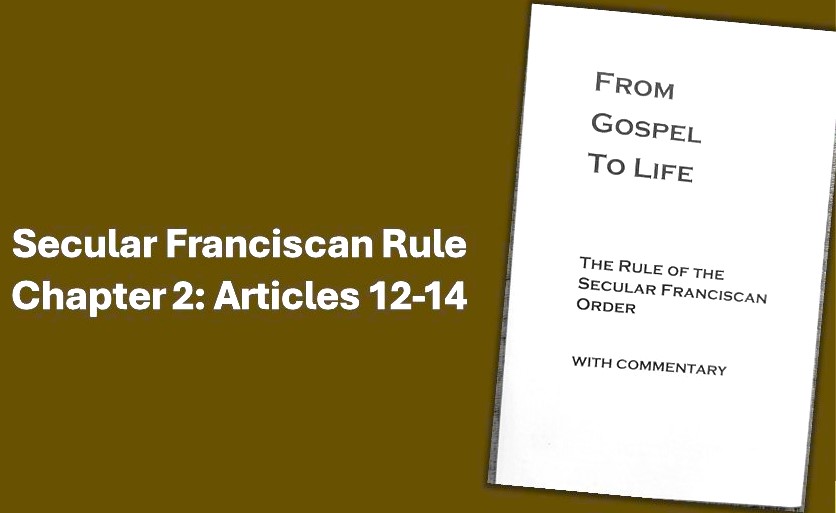
Formation Friday March 15, 2024
The OFS-USA National Fraternity has recently published “From Gospel to Life,” the OFS Rule with Commentary. This occasional series highlights the Prologue (See November 17th and 24th) and the articles of the Rule, the commentary, and questions based on this publication for fraternity discussion. You may order “Gospel to Life” by clicking on the blue font.
Rule of the Secular Franciscan Order
Chapter 2 Articles 12, 13, and 14
Article 12: Witnessing to the good yet to come and obliged to acquire purity of heart because of the vocation they have embraced, they should set themselves free to love God and their brothers and sisters.21
Article 13: As the Father sees in every person the features of his Son, the firstborn of many brothers and sisters,22 so the Secular Franciscans with a gentle and courteous spirit accept all people as a gift of the Lord and an image of Christ.23
A sense of community will make them joyful and ready to place themselves on an equal basis with all people, especially with the lowly for whom they shall strive to create conditions of life worthy of people redeemed by Christ.24
Article 14: Secular Franciscans, together with all people of good will, are called to build a more fraternal and evangelical world so that the kingdom of God may be brought about more effectively. Mindful that anyone “who follows Christ, the perfect man, becomes more of a man himself,” let them exercise their responsibilities competently in the Christian spirit of service.25
Commentary
Article 12: The result of simple living in gospel poverty is freedom to seek and share the great treasure of the kingdom: loving God and neighbor (12).
Article 13: Hand in hand with simple living is coming to recognize that in Christ all are equally brothers and sisters (13). There is no room for prejudice or exclusiveness in the Franciscan way of life. In fact, the sense of community and the will toward community compel the Secular Franciscans to discover Christ in everyone, especially the lowly and poor and disadvantaged.
Article 14: The natural consequence to simple living and a sense of community is selfless service (14). Secular Franciscans expend themselves by using their special talents, competence, and responsibility. Thus, they bring to others the experience of God and the hope for achieving their full humanity.
For discussion with a partner, in a group, or to comment on in your journal:
+Re-read article 12 and the commentary:
–What do you think “set themselves free means?”
- How do you set yourself free to love God?
- How do you set yourself free to serve others?
- How can you simplify your life so that living the gospel becomes possible?
+Re-read article 13 and the commentary
—How do you see Christ in others?
- What is challenging about accepting everyone as a “gift of the Lord and an image of Christ?”
- How do our relationships with others affect fraternity and family life?
+Re-read article 14 and the commentary
—What does carrying out our responsibilities effectively mean to you?
- How do you use your talents in service to others?
- How do you set priorities in your service to others?
*************************
Formation Friday March 8, 2024
(En español abajo)
The OFS-USA National Fraternity has recently published “From Gospel to Life,” the OFS Rule with Commentary. This occasional series highlights the Prologue (See November 17th and 24th) and the articles of the Rule, the commentary, and questions based on this publication for fraternity discussion. Click on the blue font to order “Gospel to Life”.
Rule of the Secular Franciscan Order
Chapter 2 Articles 10-11
Article 10: Uniting themselves to the redemptive obedience of Jesus, who placed his will into the Father’s hands, let them faithfully fulfill the duties proper to their various circumstances of life.17 Let them also follow the poor and crucified Christ, witness to him even in difficulties and persecutions.18
Article 11: Trusting in the Father, Christ chose for himself and his mother a poor and humble life,19 even though he valued created things attentively and lovingly. Let the Secular Franciscans seek a proper spirit of detachment from temporal goods by simplifying their own material needs. Let them be mindful that according to the gospel they are stewards of the goods received for the benefit of God’s children.
Thus, in the spirit of “the Beatitudes”, and as pilgrims and strangers on their way to the home of the Father, they should strive to purify their hearts from every tendency and yearning for possession and power.20
Commentary
Article 10: The first phase of evangelizing shows how the Secular Franciscans live in this world (10–12). Those who go “from gospel to life” have simple living (10–12), an experience of togetherness (13), and selfless service (14) as qualities of everyday living.
Simple living begins with the choice to unite with Christ so intensely that one is willing to share even his passion: the burdens of hardship and pain within oneself or from outside sources.
Article 11: Simple living also takes shape (11) by reducing material needs, by curbing a thirst for possessions and the domineering power that comes from ownership, and by using all God’s gifts in a spirit of generosity, justice, and moderation. Gospel poverty for Secular Franciscans, then consists in acquiring possessions justly, keeping needs to a minimum, and using what they have as custodians for the generous benefit of others. In this way they live for the kingdom of God and not for this world, according to the charter for happiness given in the “Beatitudes.”
For discussion with a partner, in a group, or to comment on in your journal:
+Re-read article 10 and the commentary:
–What are the “circumstances” of your life?
- How does the fulfillment of your responsibilities reflect your relationship with Jesus?
- Give examples of how you “go from gospel to life and life to the gospel.”
- How can you simplify your life so that living the gospel becomes possible?
—How does fulfilling your duties as a layperson help to evangelize others?
+Re-read article 11 and the commentary
—Reflect on “gospel poverty.”
- How can you live in moderation? (Not only possessions but attitudes and relationships with others.)
- Explain what you think living as “pilgrims and strangers” means. Can you think of some concrete examples?
- What do you think the “spirit of the Beatitudes” means?
*************************
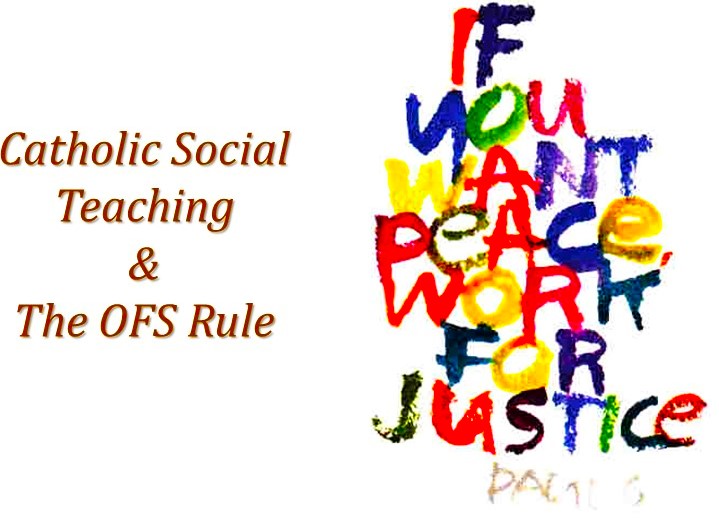
*************************
Formation Friday, March 1, 2024
Catholic Social Teaching—From St. Francis to the Secular Franciscan Rule
In the Legend of the Three Companions, we read: He [Francis] used to tell them: “As you announce peace with your mouth, make sure that greater peace is in your hearts. Let no one be provoked to anger or scandal through you, but may everyone be drawn to peace, kindness, and harmony through your gentleness. For we have been called to this: to heal the wounded, bind up the broken, and recall the erring. In fact, many who seem to us to be members of the devil will yet be disciples of Christ.”
The Founder p. 102
The Catholic Church has given us the Seven Themes of Catholic Social Teaching. The Secular Franciscan Rule of 1978 helps us to make them part of our daily lives. Lent is the perfect time for us to reflect on this comparison.
1- CST: LIFE AND DIGNITY OF THE HUMAN PERSON—The Catholic Church proclaims that human life is sacred and that the dignity of the human person is the foundation of a moral vision for society.
+OFS RULE: Articles 15 and 17:Promote justice and peace and respect for life
2- CST: CALL TO FAMILY, COMMUNITY, AND PARTICIPATION—We are both sacred and social; part of society.
+OFS RULE: Articles 13 and 17: A sense of community—ready to place themselves on an equal basis with all people; Cultivate a spirit of peace, fidelity, and respect for life in the family. Husbands and wives should bear witness in the world of the love of Christ for his Church.
3- CST: RIGHTS AND RESPONSIBILITIES—The Catholic tradition teaches that human dignity can be protected and a healthy community can be achieved only if human rights are protected, and responsibilities are met.
+OFS RULE: Article 14: [We] are called to build a more fraternal and evangelical world; exercise our responsibilities competently.
4- CST: OPTION FOR THE POOR AND VULNERABLE—How are the most vulnerable faring?
+OFS RULE: Articles 13 and 15: Accept all people as a gift of the Lord. Place ourselves on an equal basis with the lowly…; Be in the forefront of promoting justice…
5- CST: THE DIGNITY OF WORK AND THE RIGHTS OF WORKERS—The economy should serve people not vice versa.
+OFS RULE: Article 16: Let them esteem work both as a gift and as a sharing in the creation, redemption, and service of the human community.
6- CST: SOLIDARITY—We are one human family.
+OFS RULE: Articles 13 and 19: …place themselves on an equal basis with all people, especially the lowly. …trusting in the presence of the divine seed in everyone and in the transforming power of love and pardon.
7- CST: CARE FOR GOD’S CREATION—We show respect for the Creator by taking care of His creation.
+OFS RULE: Article 18: They should respect all creatures which bear the imprint of the Most High,…
Seven Themes of Catholic Social Teaching Handout
For discussion or to answer in your journal
+How does Catholic Social Teaching (CST) apply to us as Secular Franciscans? Give “daily life” examples.
+In what ways do you live out the articles of the Rule mentioned above?
+How can our fraternities live out Catholic Social Teaching through our apostolates? Give examples of what you are already doing? What more can you do?
*************************
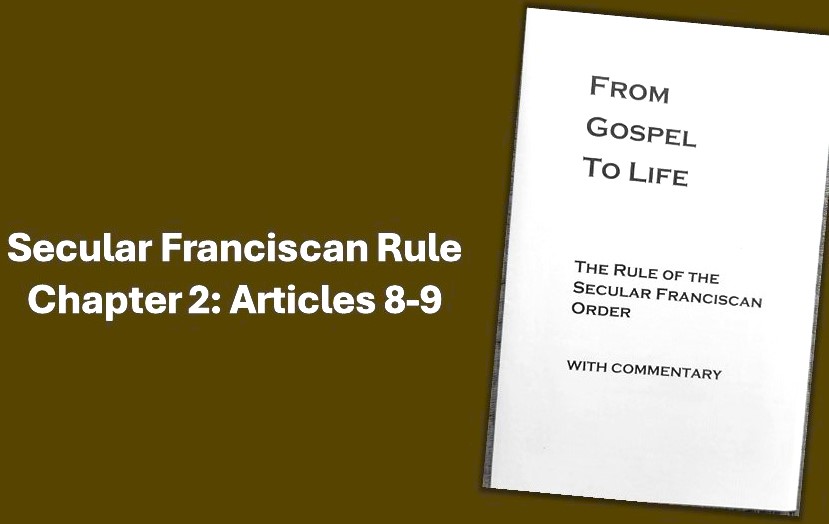
Formation Friday February 23, 2024
(En español abajo)
The OFS-USA National Fraternity has recently published “From Gospel to Life,” the OFS Rule with Commentary. This occasional series highlights the Prologue (See November 17th and 24th) and the articles of the Rule, the commentary, and questions based on this publication for fraternity discussion. You may order “Gospel to Life” at this link: https://www.secularfranciscansusa.org/wp-content/uploads/Order-Form_October_2023rev.pdf
Rule of the Secular Franciscan Order
Chapter 2 Articles 8-9
Article 8: As Jesus was the true worshipper of the Father, so let prayer and contemplation be the soul of all they are and do.
Let them participate in the sacramental life of the Church, above all the Eucharist. Let them join in liturgical prayer in one of the forms proposed by the Church, reliving the mysteries of the life of Christ.
Article 9: The Virgin Mary, humble servant of the Lord, was open to his every word and call. She was embraced by Francis with indescribable love and declared the protectress and advocate of his family. The Secular Franciscans should express their ardent love for her by imitating her complete self-giving and by praying earnestly and confidently.
Commentary
Article 8: The [second] precondition is to make worship of the Father as central in our own lives as it was in Christ’s. The Secular Franciscan, then, communicates and unites with the Lord through the sacraments (again, especially the Eucharist), the liturgy of the hours, contemplation, and any other expression of prayer.
Article 9: The description of the way of life now moves to the manner of proclaiming the gospel every day by lifestyle (10–14) and ministry or apostolic activity (15–19).
First of all, Mary’s self-giving and prayer are set up as the primary example of gospel living. Devotion to her has always been a hallmark of the Franciscan calling, both as a way of expressing love for her and as an important way of finding Jesus himself.
For discussion with a partner, in a group, or to comment on in your journal:
+Re-read article 8 and the commentary:
–Give examples of how your prayer life follows what is asked for in Article 8
- Do you spend time in silent prayer and meditation? How does this practice affect your daily life?
- Do you pray the Liturgy of the Hours each day? (Perhaps at least one of the hours?) Why is this important for us as Secular Franciscans? Why do you think we are asked to do this?
- In what other ways do you pray? How can you strengthen your prayer life?
—How important is the Eucharist to you?
- Do you receive communion frequently?
- Do you participate in Adoration? What effect does this have on your prayer life?
- Do you receive the Sacrament of Reconciliation often? How does this sacrament help your “daily conversion.”
+Re-read article 9 and the commentary
—What is your relationship with the Blessed Mother?
- Why has devotion to Mary always been important to Franciscans?
- Describe how Mary’s example can have an influence on our prayer lives?
*************************
Formation Friday February 16, 2024
The OFS-USA National Fraternity has recently published “From Gospel to Life,” the OFS Rule with Commentary. This occasional series highlights the Prologue (See November 17th and 24th) and the articles of the Rule, the commentary, and questions based on this publication for fraternity discussion. You may order “Gospel to Life” at this link: https://www.secularfranciscansusa.org/wp-content/uploads/Order-Form_October_2023rev.pdf
Rule of the Secular Franciscan Order
Chapter 2 Articles 6-7
Article 6: They have been made living members of the Church by being buried and raised with Christ in baptism; they have been united more intimately with the Church by profession. Therefore, they should go forth as witnesses and instruments of her mission among all people, proclaiming Christ by their life and words.
Called like Saint Francis to rebuild the Church and inspired by his example, let them devote themselves energetically to living in full communion with the pope, bishops, and priests, fostering an open and trusting dialogue of apostolic effectiveness and creativity.10
Article 7:
United by their vocation as “brothers and sisters of penance,”11 and motivated by the dynamic power of the gospel, let them conform their thoughts and deeds to those of Christ by means of that radical interior change which the gospel itself calls “conversion.” Human frailty makes it necessary that this conversion be carried out daily.12
On this road to renewal the sacrament of reconciliation is the privileged sign of the Father’s mercy and the source of grace. 13
Commentary
Article 6: Sharing Christ’s mission through life in the Church is the third point developed on the meaning of gospel living (6). By word and example the Secular Franciscans bring to those around them the living Christ they have experienced. As it were, they become a living gospel for all to read. This evangelization is based on obedience to the Holy Spirit, who inspires and forms the Church, the body of Christ. So, the Secular Franciscans foster an openness to the Spirit and creatively exercise their mission. Furthermore, they hear the call of the Spirit through loyalty, frank dialogue, and cooperation with legitimate Church authority. This obedience makes ministry authentic and consistent without stifling their creativity.
Article 7: The next section of the rules (7 and 8) explains the personal disposition or preconditions (conversion and worship) necessary for achieving the union with Jesus Christ and with one’s neighbor described above.
An ongoing change of heart or a continual spiritual renewal is the first condition (7) for modeling one’s own thought and deeds on those of Christ. As Francis himself points out in his letter used as the prologue, if we all love the Lord with all we are, build a eucharistic community, and remove those things that prevent such a union, we become one with him, fulfill the father’s will, and project his image onto the world. Thus, our daily conversion becomes a primary means for putting on Christ and conforming ourselves to him. The sacrament of reconciliation, then, is a privileged means and practical assistance for achieving this objective.
For discussion with a partner, in a group, or to comment on in your journal:
+Re-read article 6 and the commentary:
—How do we, as Secular Franciscans help to rebuild the Church?
—How do we respond to what the Holy Spirit asks of us?
+Re-read article 7 and the commentary:
—How do you seek conversion of heart each day? What tips would you give a new member?
—What is the value of the Sacrament of Reconciliation for us as Secular Franciscans?
*************************

Formation Friday – February 9, 2024
We have interrupted our series on the Rule with commentary for some Lenten inspiration. We publish the resources below each year in hopes that they will help everyone to focus on penance and conversion, so important in the life of a Secular Franciscan.
Thank you to the National Formation Commission for collaborating on this piece.
The Conversion Process: Ongoing and continuous conversion of the heart
For each week of Lent focus on one action item below that you would like to cultivate in a special way as part of your Lenten journey.
- Make an act of reparation or a modification of behavior to show sorrow for sin.
- Be willing to recognize and accept suffering as the consequence of separating myself from God. (Offer sufferings for the benefit of others.)
- Commit to a plan for prayer, fasting, almsgiving. (See: Joel 2:12-18)
- Intentionally evangelize a lukewarm or nonbeliever.
- Ask the Holy Spirit to make me aware of a specific moral shortcoming and for the grace to change.
- Consciously live the Beatitudes.
- Seek personal conversion through deeper prayer.
- Radically commit to the Gospel life centered on the person of Jesus.
- Savor God’s mercy, experiencing the love of God which unceasingly calls us back to Himself.
- Accept myself as I am now and strive to reach a deeper level of conversion.
- Journal on my spiritual journey made up of failures and falls and also made up of new beginnings, new discoveries.
- Use St. Francis’s paraphrase of the Lord’s Prayer for meditation.
(Click on picture below)
Questions for discussion or to answer in your journal.
+Explain how you plan to carry out the items you chose from the list above.
+Which of all the statements above might be most beneficial to your personal conversion?
+Which of the statements are the most challenging for you?
Diane F. Menditto, OFS
Vice Minister, National Fraternity, Secular Franciscan Order USA
Listen – Discern – Go Forth National Theme 2022-2025
Diane F. Menditto, OFS
Vice Minister, National Fraternity, Secular Franciscan Order USA
Listen – Discern – Go Forth National Theme 2022-2025
*************************
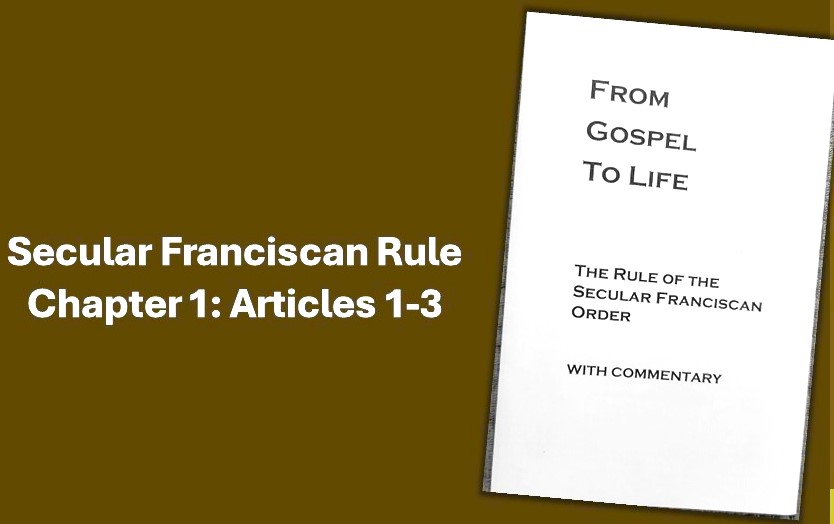
Formation Friday February 2, 2024
(En español abajo)
The OFS-USA National Fraternity has recently published “From Gospel to Life,” the OFS Rule with Commentary. This occasional series highlights the Prologue (See November 17th and 24th) and the articles of the Rule, the commentary, and questions based on this publication for fraternity discussion. You may order “Gospel to Life” at OFS-USA BOOKSTORE
Rule of the Secular Franciscan Order
Chapter 2 Articles 4-5
Article 4: The rule and life of the Secular Franciscans is this: to observe the gospel of our Lord Jesus Christ by following the example of Saint Francis of Assisi, who made Christ the inspiration and the center of his life with God and people.6
Christ the gift of the Father’s love, is the way to him, the truth into which the Holy Spirit leads us, and the life which he has come to give abundantly.7
Secular Franciscans should devote themselves especially to careful reading of the gospel, going from gospel to life and life to the gospel.8
Article 5: Secular Franciscans, therefore, should seek to encounter the living and active person of Christ in their brothers and sisters, in Sacred Scripture, in the Church, and in liturgical activity. The faith of Saint Francis, who often said, “I see nothing bodily of the Most High Son of God in this world except his most holy body and blood,”9 should be the inspiration and pattern of their eucharistic life.
Commentary:
The second chapter of the rule is a thorough and detailed description of the Secular Franciscan way of life. The first part (4–6) gives the meaning of the gospel in the Franciscan tradition. Then conversion and worship are explained as the necessary preconditions for achieving this gospel life (7–8). Finally, 9–19 describes the manner of sharing the Good News of Jesus Christ by how the Secular Franciscans live (10–14) and what they do (15–19). In the light of Scripture and the teachings of Vatican II, this chapter is envisioned as a program for evangelization: how we ourselves are evangelized after the manner of Francis and secondly how we evangelize others.
Article 4: Summarizes the heart of the rule: the very core of the gospel life in intimate union with Christ, or, in the words of St. Paul, “the life I live now is not my own; Christ is living in me” (Gal 3:20). And so, the Secular Franciscan, alive with the spirit of Francis, knows and experiences the Lord Jesus intensely, binding one’s own person with the person of Christ.
Article 5. As the process develops, then the Secular Franciscan seeks out the living and active person of Christ in all spheres of life: liturgical activity (especially the Eucharist), Scripture, Church, and one another (5). Since the sacrificial union with Christ is the most intense and comprehensive experience of his real presence, the celebration becomes the key encounter, as patterned by Francis himself.
For discussion with a partner, in a group, or to comment on in your journal:
+Re-read article 4 and the commentary:
—How is Jesus the “inspiration and center of your life?”
—Explain the meaning of “going from gospel to life and life to the gospel.”
—Challenge yourself to read a portion of the gospel each day—perhaps the gospel of the daily mass. After some time, reflect on how it has influenced your daily life. Has it changed you at all? Why or why not?
+Re-read article 5 and the commentary:
—When do you find it most difficult to see the “living and active person of Christ” in your brothers and sisters? How do you deal with this?
–What is your relationship with the Eucharist? (The answer to this may require much prayer and silence before the Blessed Sacrament.)
Diane F. Menditto, OFS
Vice Minister, National Fraternity, Secular Franciscan Order USA
Listen – Discern – Go Forth National Theme 2022-2025
*************************

Formation Friday January 26, 2024
The OFS-USA National Fraternity has recently published “From Gospel to Life,” the OFS Rule with Commentary. This occasional series highlights the Prologue (See November 17th and 24th) and the articles of the Rule, the commentary, and questions based on this publication for fraternity discussion. You may order at the blue link: “Gospel to Life”
Rule of the Secular Franciscan Order
Chapter 1 Articles 1-3
Article 1: The Franciscan family, as one among many spiritual families raised up by the Holy Spirit in the Church, unites all members of the people of God – laity, religious, and priests – who recognize that they are called to follow Christ in the footsteps of St. Francis of Assisi.
In various ways and forms but in life-giving union with each other, they intend to make present the charism of their common Seraphic Father in the life and mission of the Church.
Article 2: The Secular Franciscan Order holds a special place in this family circle. It is an organic union of all Catholic fraternities scattered throughout the world and open to every group of the faithful. In these fraternities the brothers and sisters, led by the Spirit, strive for perfect charity in their own secular state. By their profession they pledge themselves to live the gospel in the manner of St. Francis by means of this rule approved by the Church.
Article 3: The present rule, succeeding “Memoriale propositi” (1221) and the rules approved by the Supreme Pontiffs Nicholas IV and Leo XIII, adapts the Secular Franciscan Order to the needs and expectations of the Holy Church in the conditions of changing times. Its interpretation belongs to the Holy See and its application will be made by the General Constitutions and particular statutes.
Commentary
Article 1– This first chapter details the place of the Secular Franciscan Order in the Church, the Franciscan Family, and in the history of the Order itself.
The first paragraph shows how the Franciscan Family, as one of the many spiritual families in the Church, is united with all the people of God by the call of the Holy Spirit and the following of Jesus Christ. Still, in addition to this, the way of Francis gives the Franciscan Family, with its common charism but varied expressions, a distinctive cast, as it strives for holiness and binds together the laity, religious, and clergy in the life and mission of the Church.
Article 2- The second paragraph identifies the Secular Franciscan Order as a vital part of the whole family of Francis and points out its special secular character. It also stresses that all the necessary prerequisites are present to make it an official Order within the Catholic Church.
Article 3- The continuity with past rules, its influence in today’s world, and its approval by the Church are discussed in this third paragraph. This rule is the fourth expression in eight centuries. It makes the unchanging principles of Franciscan gospel living applicable and relevant today. The leaders of the Church constantly guide this movement from gospel to life.
For discussion with a partner, small group, or to comment on in your journal:
+As a professed member (or candidate) in the Secular Franciscan Order, in what ways do you feel that you are a member of the Franciscan Family?
+What is “special” about being a Secular Franciscan?
+What is the significance of the Rule in YOUR life as a Secular Franciscan? Give examples.
Diane F. Menditto, OFS
Vice Minister, National Fraternity, Secular Franciscan Order USA
Listen – Discern – Go Forth National Theme 2022-2025
*************************
Formation Friday, January 19, 2024
(En español abajo)
Focus on the Admonitions (#2 and #3)
(Click on Icon below)
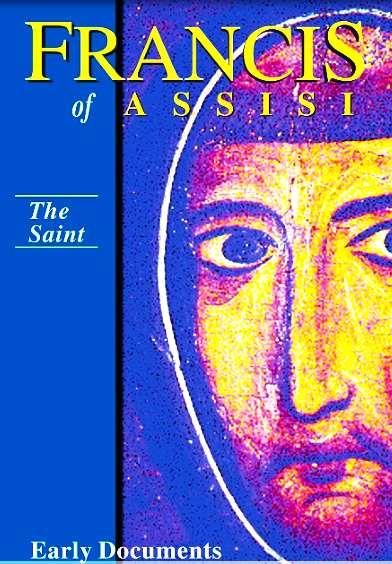
[II. The Evil of Self-Will]b
1The Lord said to Adam: Eat of every tree; you may not eat, however, of the tree of the knowledge of good and evil. Gn 2:16 Gn 2:17
2He was able to eat of every tree of paradise, because he did not sin as long as he did not go against obedience. 3For that person eats of the tree of the knowledge of good who makes his will his own and, in this way, exalts himself over the good things the Lord says and does in him. 4And so, through the suggestion of the devil and the transgression of the command, it became the apple of the knowledge of evil. 5Therefore it is fitting that he suffer the punishment.
[III. Perfect Obedience]
1The Lord says in the Gospel: Whoever does not renounce all that he possesses cannot be my disciple; Lk 14:33 2and: Whoever wishes to save his life must lose it. Lk 9:24
3That person who offers himself totally to obedience in the hands of his prelate leaves all that he possesses and loses his body.a 4And whatever he does and says which he knows is not contrary to his will is true obedience, provided that what he does is good.
5And should a subject see that some things might be better and more useful for his soul than what a prelate commands, let him willingly offer such things to God as a sacrifice; and, instead, let him earnestly strive to fulfill the prelate’s wishes. 6For this is loving obedience because it pleases God and neighbor. 1 Pt 1:22
7If the prelate, however, commands something contrary to his conscience, even though he may not obey him, let him not, however, abandon him. 8And if he then suffers persecution from others, let him love them all the more for the sake of God. 1 Jn 3:15 1 Jn 3:16 9For whoever chooses to suffer persecution rather than wish to be separated from his brothers truly remains in perfect obedience because he lays down his life for his brothers. Jn 15:13 10In fact, there are many religious who, under the pretext of seeing things better than those which the prelate commands, look back, Lk 9:62 and return to the vomit Prv 26:11 of their own will. 11These people are murderers 2 Pt 2:22 and, because of their bad example, cause many to lose their souls
Questions to discuss or to comment on in your journal.
+ Come, Holy Spirit! Open my mind and heart as I contemplate Admonition II.
—As Secular Franciscans, we do not promise “obedience” as such. However, how does sacrificing our own will help us to live out our Rule?
—When do I have the most difficulty following the directives of my lawful superiors?
+ Come, Holy Spirit! Open my mind and heart as I contemplate Admonition III.
—How is obedience related to simplicity and humility?
—What are some ways that I can seek to have a well-informed conscience?
—How does having trust in the Lord help me to let go of my own will?
Diane F. Menditto, OFS
Vice Minister, National Fraternity, Secular Franciscan Order USA
Listen – Discern – Go Forth National Theme 2022-2025
*************************
Formation Friday January 12, 2024
As we begin 2024, we turn from Greccio to Mt. Alverna, (LaVerna) from the Crib to the Cross. This year the Franciscan family will be commemorating St. Francis’s marking with the Stigmata. Although the actual day is September 17, 1224, there will be many opportunities during this year to allow these special marks to mark our lives as Secular Franciscans. We start with an excellent synopsis compiled from the Legenda Minor of St. Bonaventure and shared with us by Deacon David and Thérèse Ream, OFS. Also included below are other resources and some introductory discussion questions.
Stigmata: September 17 (Legenda Minor of St. Bonaventure)
Two years before Francis, the faithful servant of Christ, gave his soul back to God, he was alone on the top of Mt. Alverna. There he had begun a fast of forty days in honor of the archangel Michael and was immersed more deeply than usual in the delights of heavenly contemplation. His soul became aglow with the ardor of fervent longing for heaven as he experienced within himself the operations of grace.
As he was drawn aloft through ardent longing for God one morning near the feast of the Exaltation of the Cross [September 14], and was praying on the mountainside, he saw what appeared as a seraph with six bright wings gleaming like a fire descending from the heights of heaven. As this figure approached in swift flight and came near the man of God, it appeared not only winged but also crucified. The sight of it amazed Francis and his soul experienced joy mingled with pain. He was delighted with the sight of Christ appearing to him so graciously and intimately and yet the awe-inspiring vision of Christ nailed to the cross aroused in his soul a joy of compassionate love.
When the vision vanished after a mysterious and intimate conversation, it left Francis aglow with seraphic love in his soul. Externally, however, it left marks on his body like those of the Crucified as if the impression of a seal had been left on heated wax. The figures of the nails appeared immediately on his hands and feet. The heads of the nails were inside his hands but on top of his feet with their points extending through to the opposite side. His right side too showed a blood-red wound as if it had been pierced by a lance, and blood flowed frequently from it.
Because of this new and astounding miracle unheard of in times past, Francis came down from the mountain a new man adorned with the sacred stigmata, bearing in his body the image of the Crucified not made by a craftsman in wood or stone, but fashioned in his members by the hand of the living God. [Francis was the first person in the history of Christianity to receive the sacred stigmata. The Franciscan Family celebrates the Feast of the Stigmata on September 17.]
Resources:
The Life of St. Francis by Thomas of Celano (FA:ED Vol. 1 p. 263 (Chapter III)
Francis of Assisi: Early Documents – The Saint – (Click on picture)
Centenary Resources: Stigmata
The Stigmata Celebration of the 800th Anniversary
Questions for discussion or to answer in your journal:
+What struck you about the description given above?
+How does meditating on this great gift given to St. Francis help you to come closer to Christ?
+What puzzles or surprises you about Francis’s receiving the stigmata?
+List some incidents in Francis’s life or passages in his writings that help you to understand why God might have given Francis this gift
*************************
Formation Friday January 5, 2024
(Recursos en español abajo)
Taking Stock 2024 Our Lives of Prayer as Secular Franciscans
“As Minister General of a large Order, St. Bonaventure provided, among other things, spiritual direction for those seeking God. In a letter to Poor Clare nuns, he offered directives as to how we might enter into prayer by way of ‘descent.’
“The steps are summarized as follows:
- Return to yourself; Enter into your heart;
- Ponder what you were, are, should have been, called to be;
- What you are by nature;
- What you are through sin;
- What you should have been through effort;
- What you can still be through grace;
- Meditate in your heart;
- Let your spirit brood. (Are you resentful, angry, jealous?);
- Plow this field, work on yourself;
- Strive for freedom within, the freedom that leads to relationship with God, realizing that God will never force us to love him;
- Lack of self-knowledge and failure to appreciate one’s own worth make for faulty judgment in all other matters;
- If you are not able to understand (and accept) your own self, you will not be able to understand (or accept) what is beyond you.”
Bonaventure, Perfectione vitae ad sorores (Perf. Vit.) 1.5 (VIII, 109). Engl. trans. Jose de Vinck, “On the Perfection of Life, Addressed to Sisters,” in The Works of Bonaventure, vol. 1, Mystical Opscula (Paterson, N.J.: Saint Anthony Guild Press, 1960), 214.
Quoted in: Delio, Ilia. Franciscan Prayer (Kindle Locations 613-616). Kindle Edition.
For our Prayer Journey as Secular Franciscans
- We take as our “book” the poor and crucified Christ
- Our “inspiration” the writings of Francis, Clare, Bonaventure
- Our “guide” the Holy Spirit
- Our “model” Mary
- Our “core” the gospel
- Our “focus” the life of penance we profess to live
- Our “sustenance” the Eucharist, Sacraments and prayer.
FUN Manual The rule of the SFO page 27 of 46
Questions for discussion or to comment on in your journal
+How has your prayer life changed over the years?
+If you are a Secular Franciscan, how does your prayer reflect who you are as member (or candidate) of the Order?
+Does prayer influence how you live your life?
+Based on St. Bonaventure’s directives above, how can you strengthen your prayer life?
